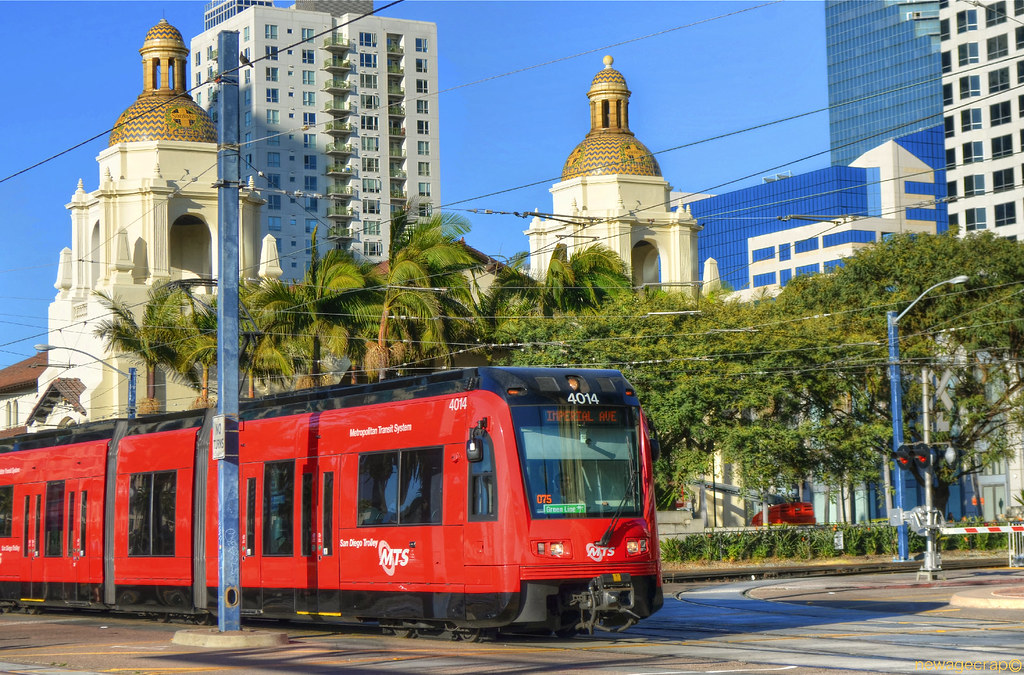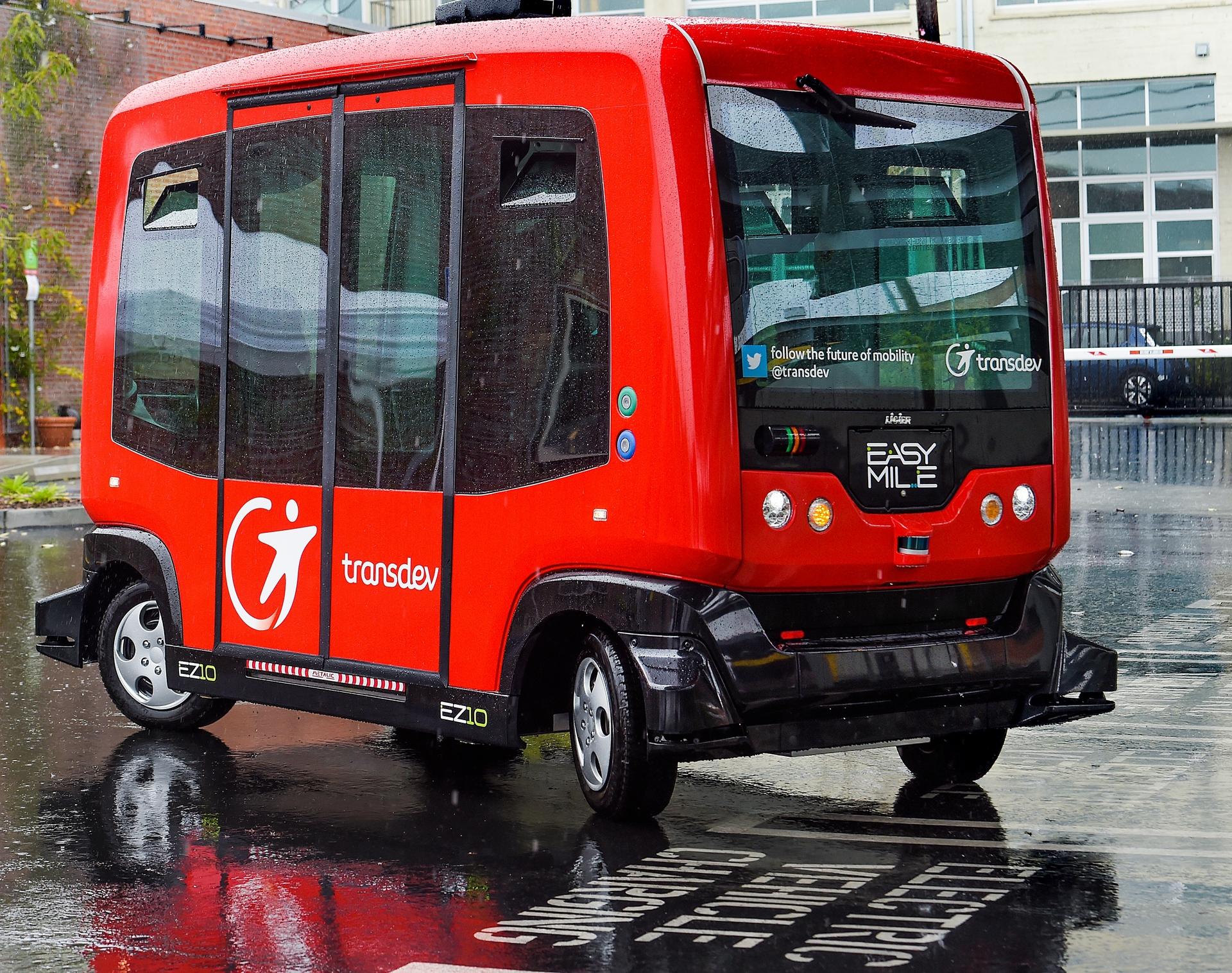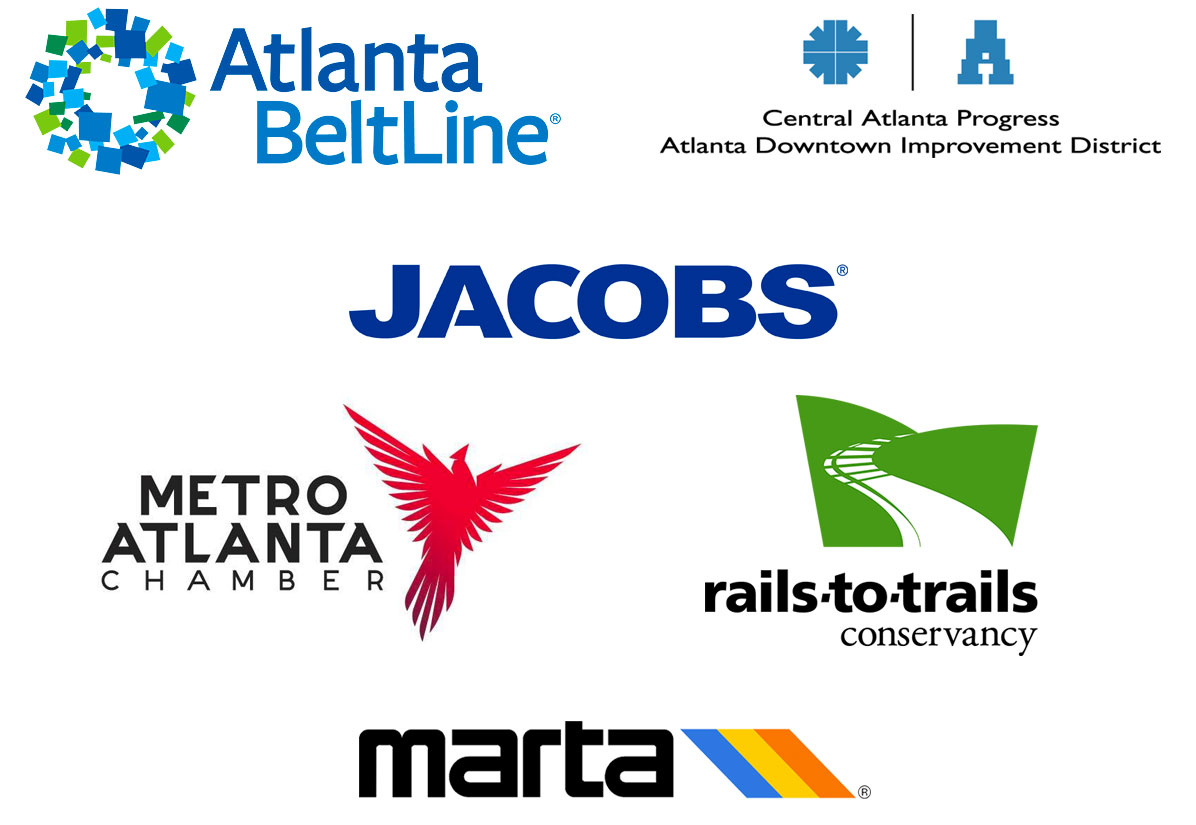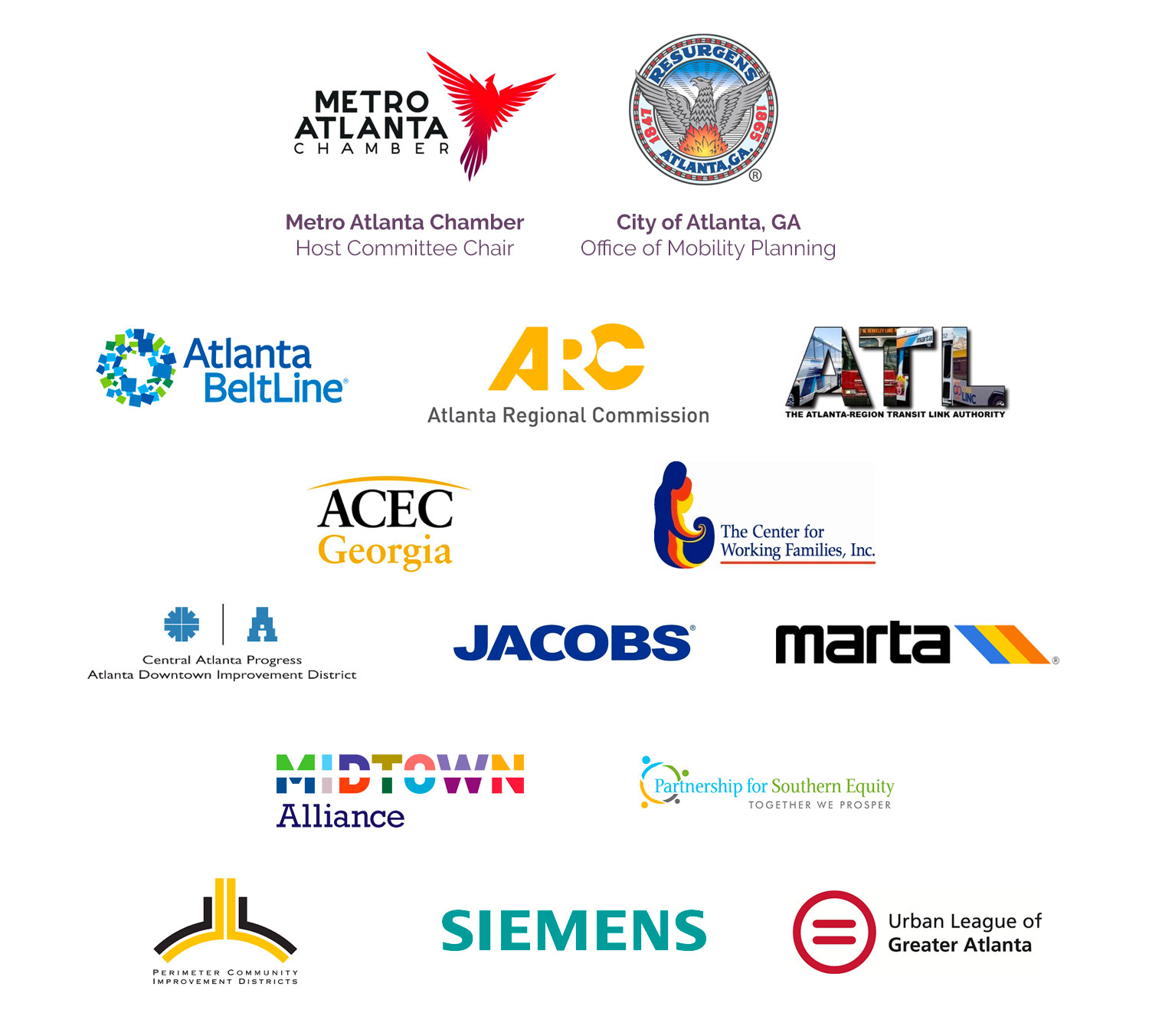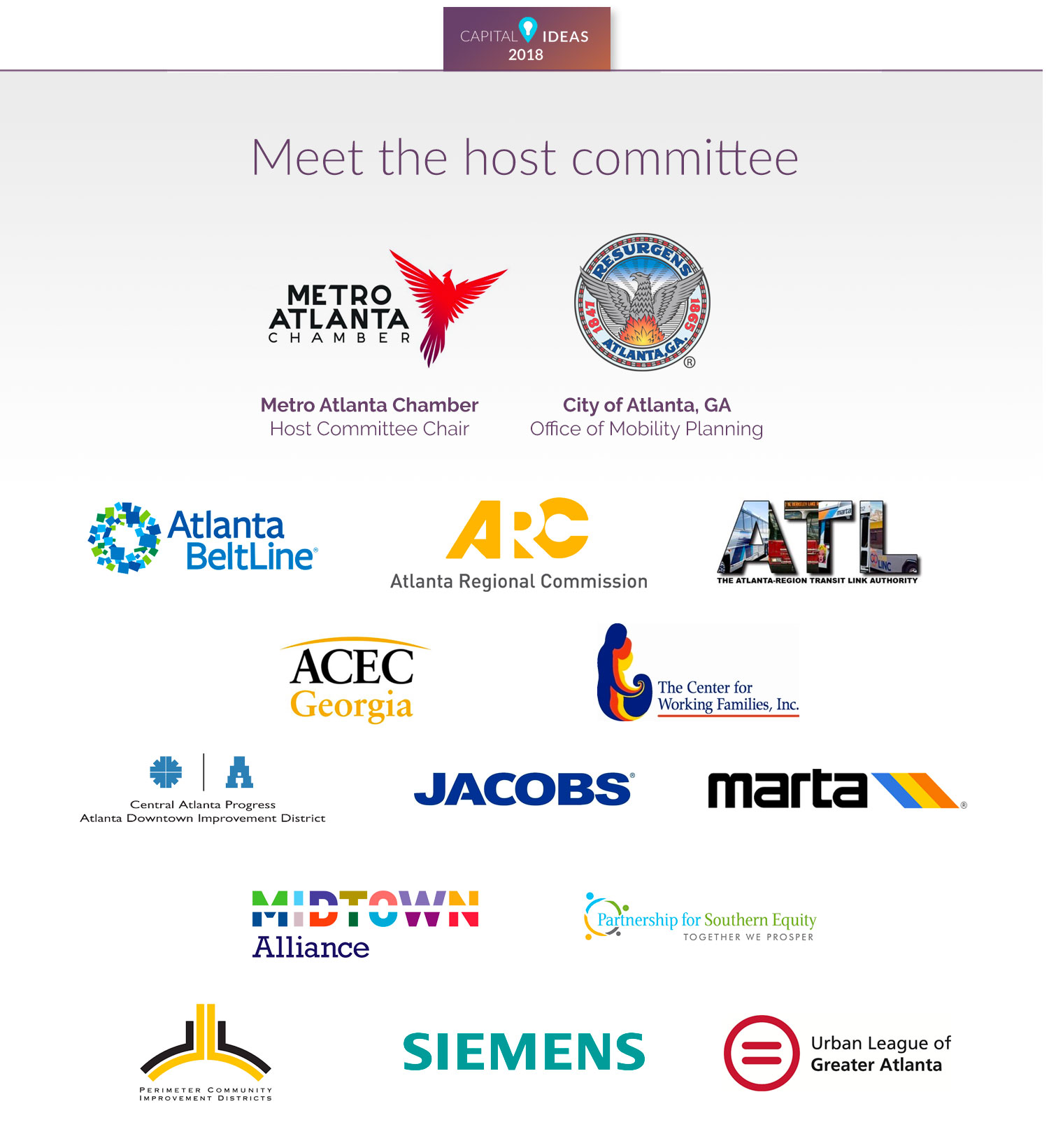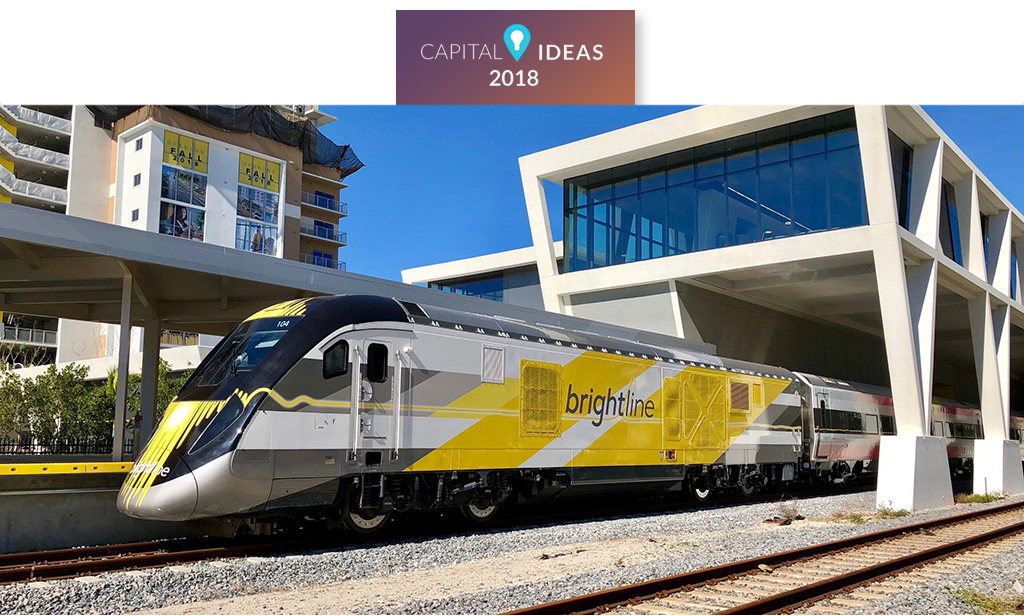Click here (pdf) for member-exclusive analysis of the November 2018 elections.
Mixed messages on transportation at the ballot box this week
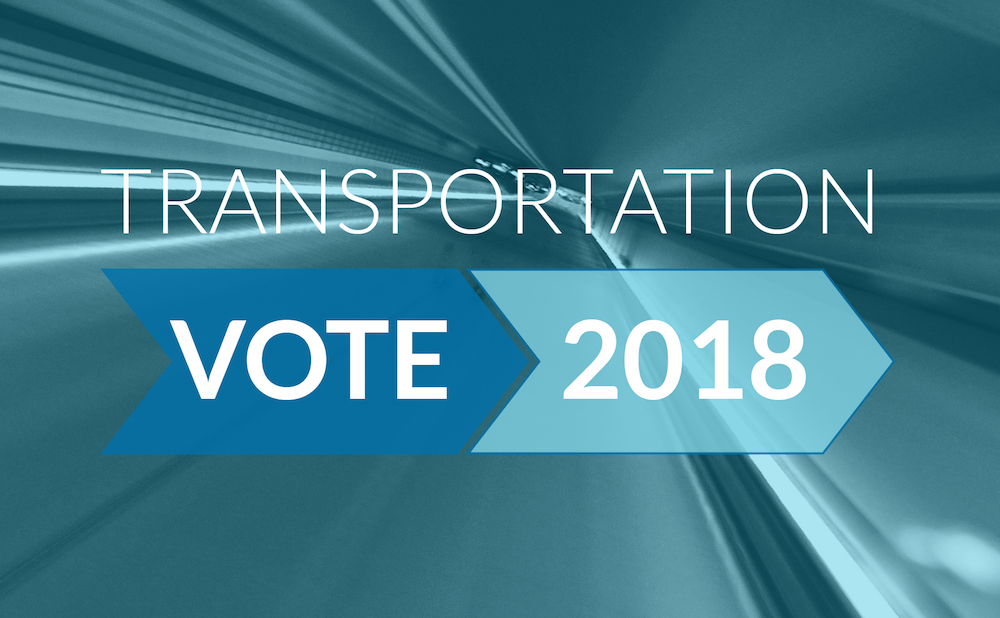
With a range of notable ballot measures for transportation considered by voters Tuesday, how did the issue fare at the ballot box? Did the recent trends for transportation-related measures continue?
Compared with two years ago when there were a number of major, big-ticket ballot measures to raise billions in new local revenue for transit on the ballot, there were relatively few local ballot measures raising new money for ambitious bus or rail transit projects in 2018. We’ll get into what actually happened at the local level, but this year, one of the more interesting trends emerged at the state level.
[member_content]
T4America members: We’ve produced a more detailed post-election analysis for you. You can download that short document here. Reach out to us if you have any questions.
[/member_content]
Statewide
The biggest question on the ballot was Proposition 6 in California, which would have undone the state’s 2017 legislation that increased fuel taxes to raise more than $50 billion to prioritize repair and pledge billions toward transit, safe streets for walking and biking, and an overall multimodal approach to solving the state’s transportation challenges. The legislation also gave money directly to California localities to spend on their greatest needs, allowing for a strong measure of local control.
Proposition 6 was defeated—preserving 2017’s tax increase—with just 45 percent in favor. Of all the states that have raised new transportation revenues since 2012, California was one of the few that raised new money that could be used on a diverse range of needs. Voters just signaled their approval for this approach a year later.
By contrast, statewide proposals to raise new revenues for transportation—almost all for only roads—failed in Missouri and Colorado, as well as a non-binding advisory measure in Utah that went down by a wide margin. While a portion of Colorado’s gas tax dollars (those directed to localities) can be used on any transportation purpose, both Missouri and Utah have constitutional prohibitions on 100% of their gas tax dollars, preventing them from being spent on any other transportation needs.
What’s the trend to extrapolate from these four measures? The latter three measures were essentially status quo referenda on whether or not voters want to put more money into the existing state system for transportation. The taxpayers resoundingly answered “no.” In Missouri’s case, this was their second run at raising state fuel taxes for only roads, and like in 2014, voters in the state’s metro areas widely rejected the measure, viewing the taxes as regressive and a way to funnel money out of their metro area to pay for needs elsewhere in the state. All three contrast with California’s new system to devote new taxes toward a range of multimodal projects that was reaffirmed by voters.
This will be the most pressing question of 2019 as Congress ramps up to work on reauthorization. Do the American taxpayers believe that the federal transportation system works for them? Will they be supportive of federal legislators raising their taxes or creating new revenues to put into the same old system?
Local
At the local level, there were notable measures approved in Broward County (north of Miami) and Hillsborough County (Tampa). Broward’s penny sales tax increase would raise $15.6 billion over 30 years, largely for transit with about $9 billion earmarked for new light rail lines. In Tampa’s case, after a few failed attempts, they finally passed a measure with money for transit that raises the sales tax by a penny to raise about $275 million annually for transportation. (Revenues are split 45/55 between transit and roads/other projects.)
Federal
Many want to know how the changeover in House leadership will impact transportation, and particularly transit funding. It’s worth noting, however, that it’s been a bipartisan effort in Congress to press on USDOT to keep these transit projects moving. It was a Republican House and Senate that approved an unprecedented provision to the 2018 appropriations bill requiring USDOT to obligate all of their 2018 transit capital grants before the end of 2019. And it was a Republican move in the Senate to require Trump’s USDOT to use President Obama’s TIGER grant qualifications for the last round of TIGER grants.
Will much else change with the House’s leadership transition? The top Democrat on the House Transportation and Infrastructure Committee—the committee charged with writing policy for the 2020 reauthorization—went on the record today saying that federal transportation policy is just fine as it is. All we need is more money.
No notable reforms for 2020 fed reauthorization in wake of House flip? “We don’t need much more policy changes. We have pretty good policy in the FAST Act. It’s just inadequate funding,” @RepPeterDeFazio told Bloomberg.
— Transport. 4 America (@T4America) November 7, 2018
We’ll have more on the federal angle in the coming days. View our tracker for 2018 state and local ballot measures for transportation here.
USDOT’s AV Guidance: Preparing for the Future of Transportation: Automated Vehicles 3.0

On October 11, 2018, the US Department of Transportation (USDOT) released Preparing for the Future of Transportation: Automated Vehicles 3.0. According to the USDOT, this document builds upon, but does not replace the voluntary guidance previously released in 2017 as Automated Driving Systems 2.0: A Vision for Safety. An analysis exclusively for Transportation for America members on this latest guidance is here.
Crookston, MN: Where investment in public transit and hard-working Americans “help buses come alive”
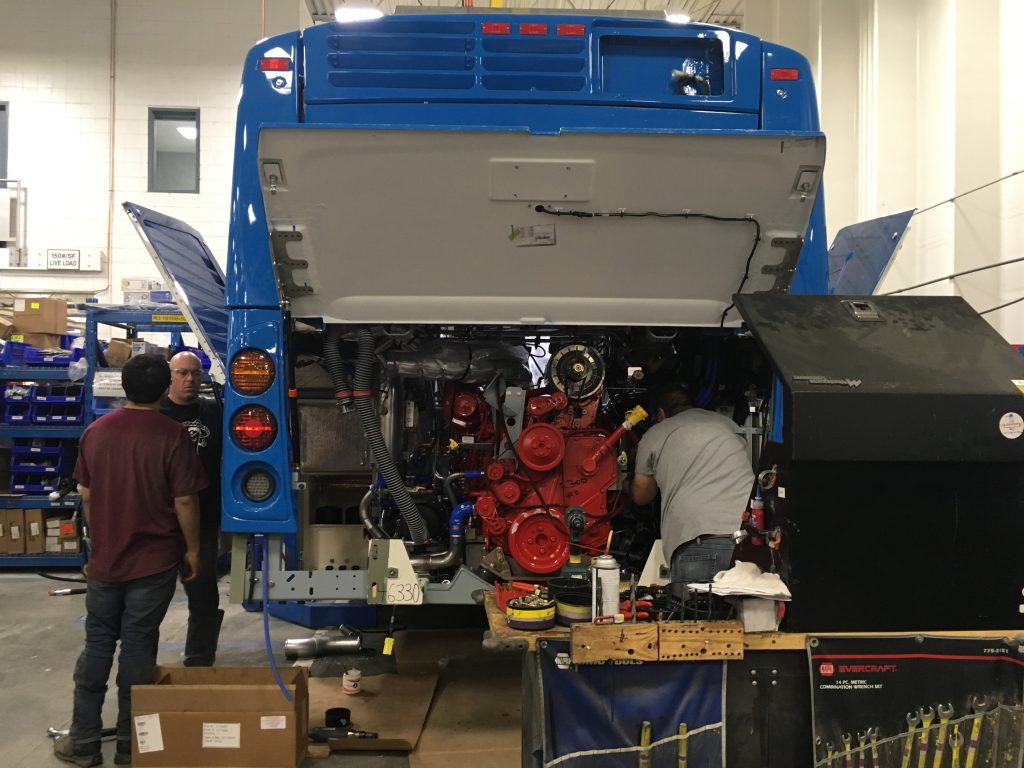
Last week Transportation for America traveled to one of New Flyer of America’s transit bus manufacturing facilities in northern Minnesota to meet with state and local leaders like State Representative Deb Kiel, and get a close look at the economic impact of public transportation dollars on Minnesota manufacturing jobs.
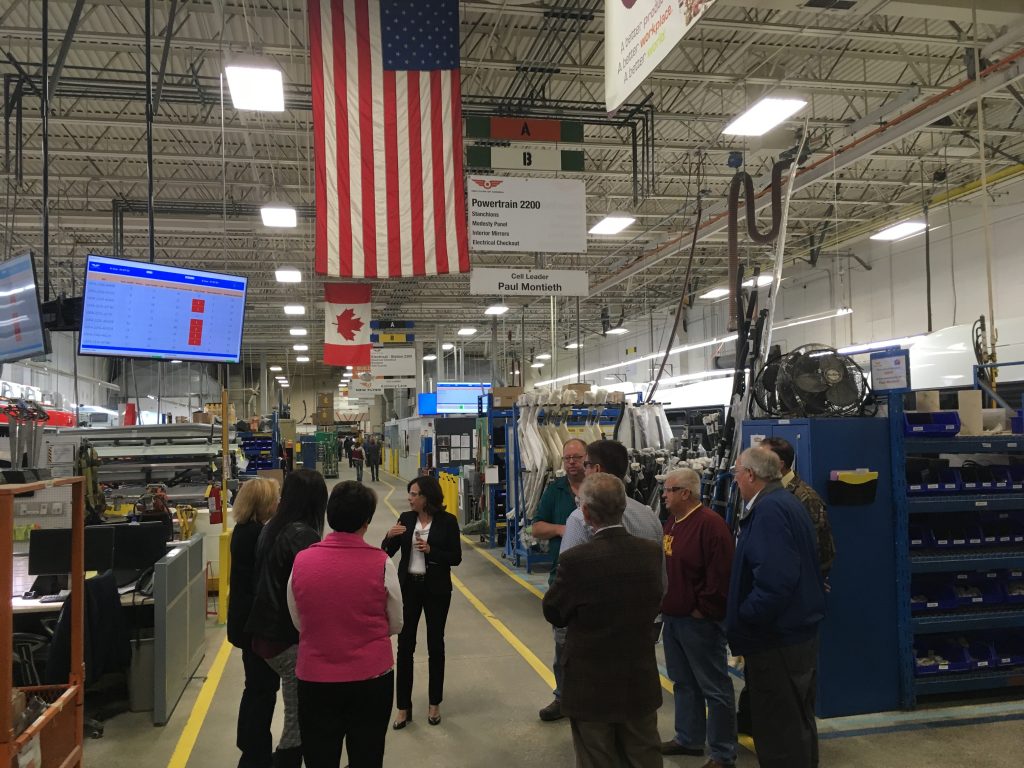
State and local leaders get an inside look at New Flyer of America’s transit bus production line in Crookston, MN. New Flyer proudly flies both the US and Canadian flag as part of NFI Group Inc., a multinational company and North America’s largest bus manufacturer with 31 facilities across the U.S. and Canada.
When Americans think about transit, the first thing that comes to mind might be a bus or train moving people in a coastal, bustling urban area. But the work of manufacturing that bus or railcar—as well as its thousands of component parts— is made possible by the billions in state, local, and federal funds invested in transit each year. And those dollars have effects that ripple out to communities of nearly all sizes across the country.
Last week, we convened state and local leaders like State Representative Deb Kiel, Crookston Mayor Wayne Melbye, staff from U.S. Representative Colin Peterson’s office, and others at New Flyer of America’s transit bus manufacturing facility in Crookston, MN for a discussion about how federal, state, and local money invested in public transportation supports and creates jobs in Minnesota and across the country.
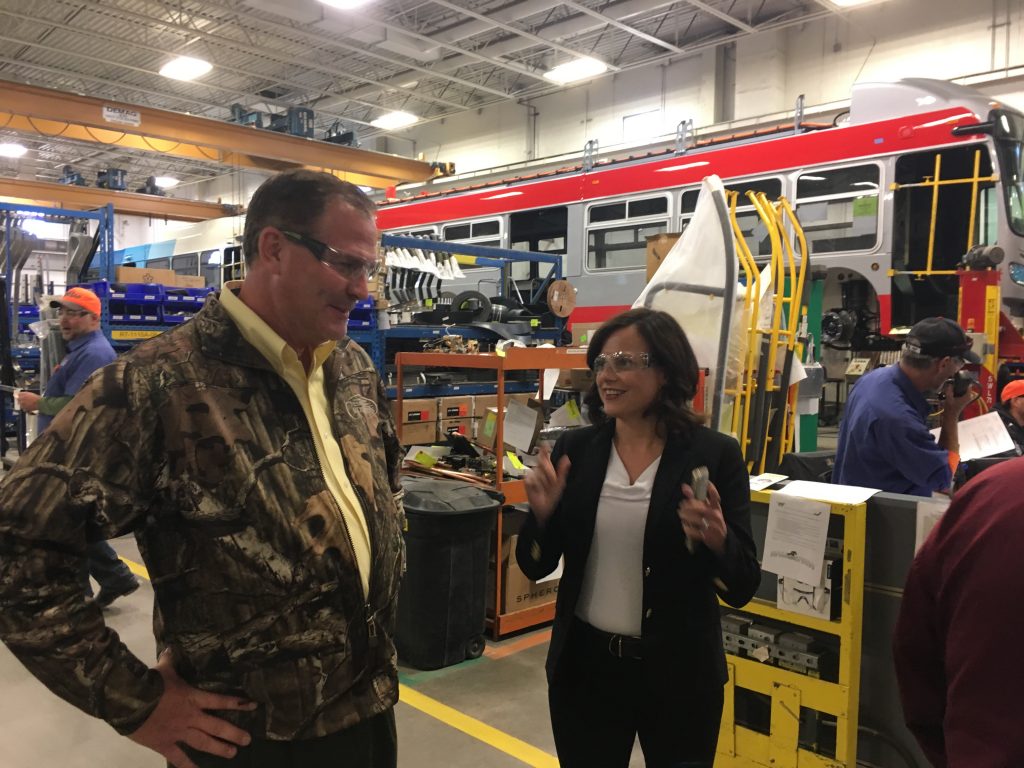
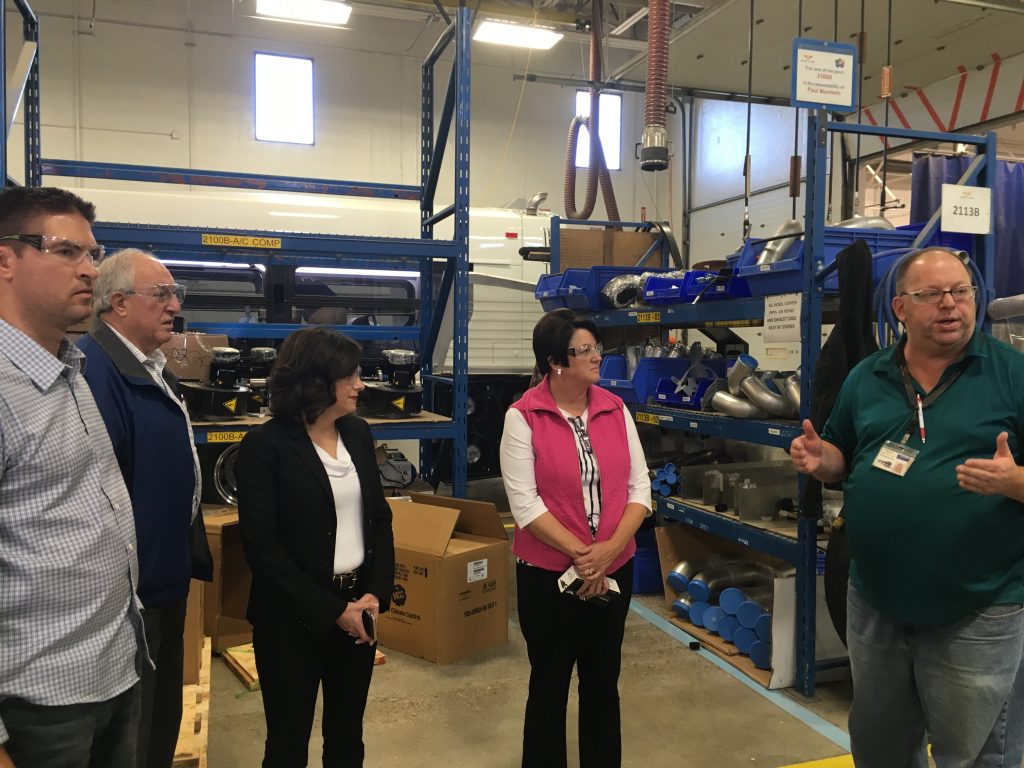
(Left) Jennifer McNeill, New Flyer Vice President of Sales and Marketing talks with Craig Hoiseth, Executive Director at Crookston Housing & Economic Development Authority. (Right) Second from right, Rep. Deb Kiel, and other local leaders hear from New Flyer about the inner workings of the Crookston facility.
Crookston, located in the far northwest corner of the Minnesota, is home to one of New Flyer of America’s four transit bus manufacturing facilities in the U.S. New Flyer of America serves all 25 of the largest transit agencies in North America, and is responsible for about half of the transit buses we see on our roads today.
Each week at the Crookston facility alone, they produce about 20 buses that end up serving communities across the U.S. On the tour we saw technicians in this small, rural community in Minnesota hard at work to build buses destined for cities like Phoenix and San Francisco, painting a compelling picture of just how the supply chain for transit ripples from coast to coast.
New Flyer employs over 1,200 people between its two manufacturing facilities in Minnesota. Like many manufacturers, New Flyer needs a trained and consistent workforce to succeed; both time and money are wasted if you have to retrain a workforce every few years. As Jennifer McNeill, New Flyer Vice President of Sales and Marketing, noted, these are skilled manufacturing jobs, not jobs that can be switched on and off as needed.

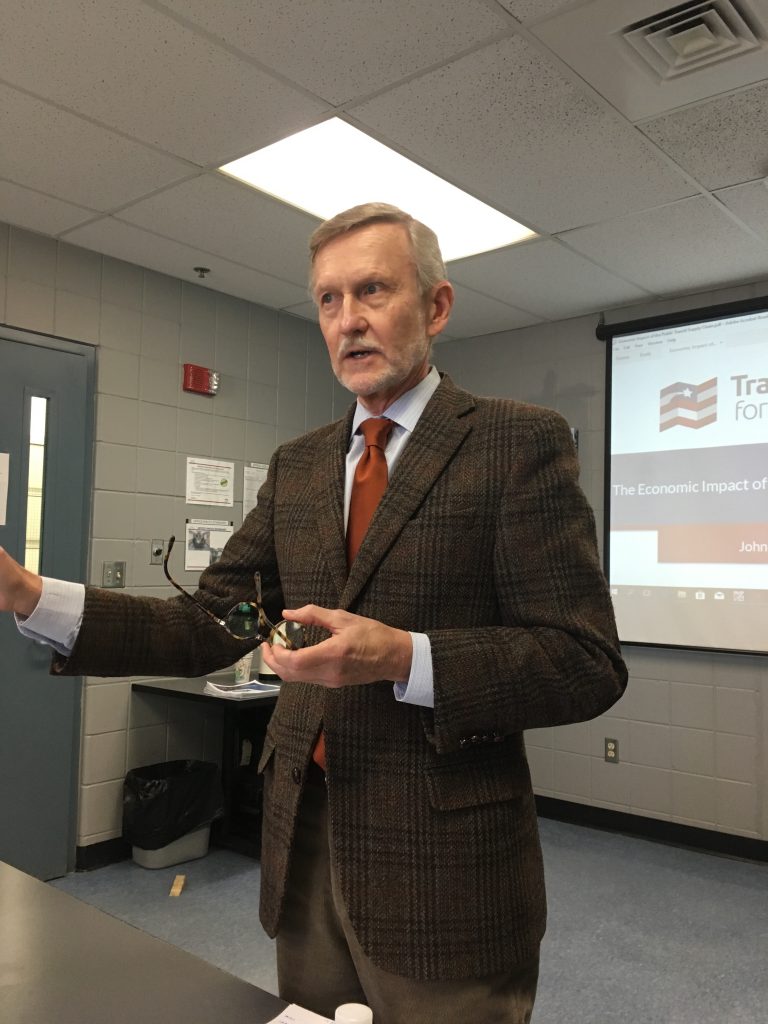
(Left) New Flyer employees building out the inside of a bus. (Right) Chairman of Transportation for America, John Robert Smith, speaks to the economic impact of public transportation dollars on manufacturing jobs.
70 percent of New Flyer’s buses are purchased with public dollars, and it’s clear that these Minnesota manufacturing jobs—and others in Alabama, Indiana, Kentucky, New York, Washington, and Wisconsin—are directly reliant on the federal government continuing to make smart investments in transit.
Unfortunately, ongoing transit funding isn’t entirely certain today. The U.S. Department of Transportation (USDOT) has been slow to award grants from the major federal program that helps communities make new investments in high-quality transit service. But the issue goes beyond discretionary grant programs. Congress has had difficulty passing multi-year transportation funding bills and finding dedicated funding sources for transportation. Before passing the FAST Act in December 2015 (which funds federal transportation investments through 2020), Congress passed 35 short-term extensions, which creates the kind of uncertainty that threatens manufacturing jobs that depend on a stable pipeline of orders and projects.
Federal money invested in public transportation each year leverages local and state funding and supports thousands of high paying manufacturing jobs in communities like Crookston, and in nearly every state across the country. Our recent report on the public transportation supply chain found that 91 percent [396 of 435] of congressional districts host at least one manufacturer.
Without predictable and stable federal and state funding, we may see transit agencies cut projects and be pressured to cancel bus and railcar orders from manufacturers across the country like New Flyer.
Federal investments in transit go far beyond building buses and trains for big cities. The transit supply chain supports high quality, valuable, and sustainable jobs in communities like Crookston all across the country. As members of Congress are considering federal appropriations and future long-term transportation funding bills, they should remember the hard working Americans in communities of all sizes that depend on transit funding.
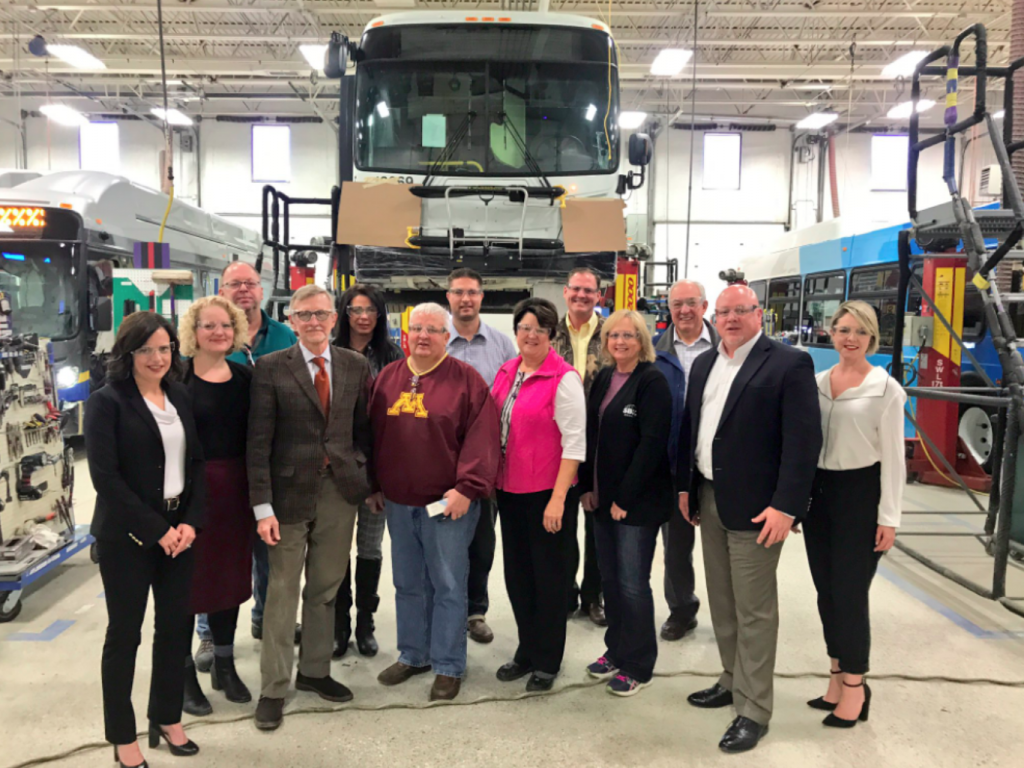
Photo courtesy of New Flyer
Florida is out in front on driverless vehicles
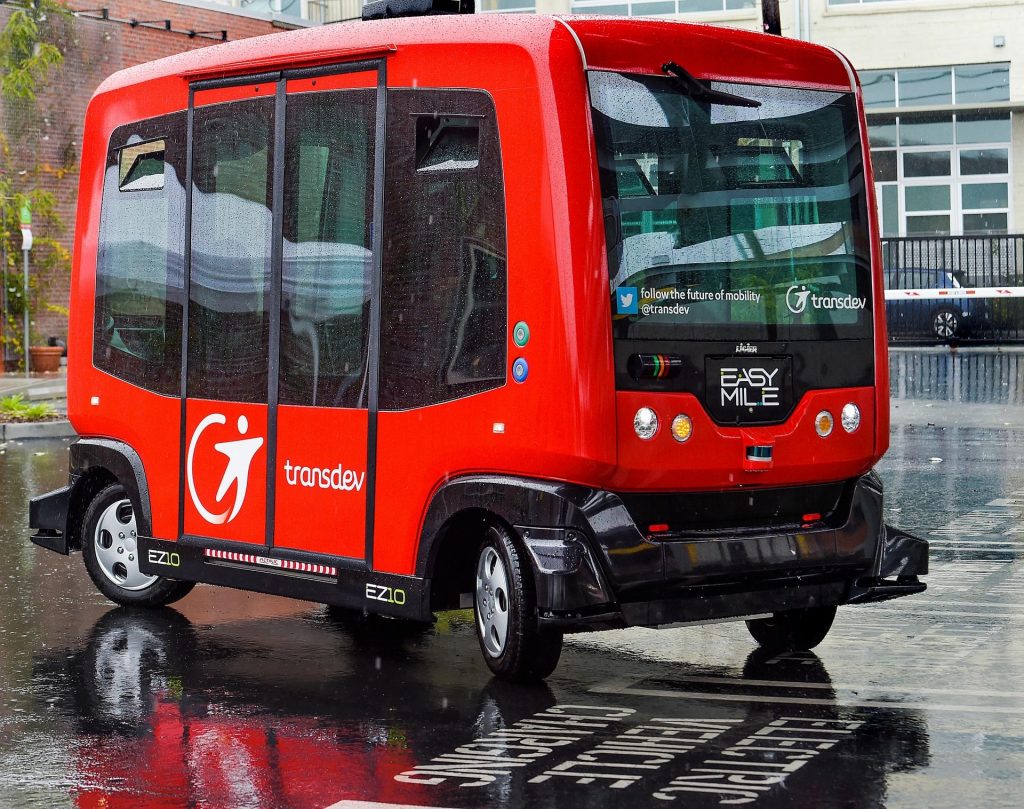
The State of Florida knows that the way they’ve done transportation projects for the last 50 years won’t be the way to do them for the 50 years ahead. That’s why the Florida Department of Transportation, in partnership with the City of Gainesville, state legislators, and mobility company Transdev, are piloting one of the first autonomous vehicle shuttle projects in the country.
“It can’t just be a research project. It needs to move people,” says Dan Hoffman, Assistant City Manager for the City of Gainesville, which is the location of the pilot. “We want to understand how this technology could support an entire transportation network.”
Gainesville’s shuttle is currently in the testing phase. Once in operation, its route will connect the University of Florida’s campus and downtown Gainesville. It would be among the first automated vehicles in the nation to provide fixed-route transit services in mixed traffic on public roads.
“Florida is putting their money where their mouth is,” says Hoffman. “We want economic development. We want people to be safer on our roads. We are willing to start thinking in new ways about how to accomplish that.”
Dramatic advances in transportation technology are part of what’s powering Gainesville’s shuttle. But the project wouldn’t have been possible without making changes and innovations to state transportation policy. In 2016, the Florida Legislature passed the nation’s first legislation to legalize fully autonomous vehicles on public roads without a driver behind the wheel. Several other cities in Florida have started pilot projects with driverless vehicles since then, and other states have since moved to follow Florida’s lead.
To discuss how Gainesville and the State of Florida are doing this work, and what other states can learn from it, Dan Hoffman will one of our featured speakers at Capital Ideas 2018, taking place on December 5 and 6 in Atlanta, GA. Register for the conference today to hear more details about Gainesville’s driverless vehicle project and ask questions about your own projects.
Why come all the way to Atlanta if you can read about the project online?
“You always pick up nuances about the work at presentations and events,” Hoffman says. “People feel a little more comfortable being honest in person and that’s really the biggest benefit of events like Capital Ideas. You get to connect with the people who do your type of work in other places and have conversations that are a little more wonky or specific than with anyone else. To me, that’s the biggest benefit.”
Get your ticket to Capital Ideas 2018 today to hear from Dan and to discuss your own community’s work on autonomous vehicles and the future of new mobility. We hope to see you in Atlanta in December.
—
Promotional partners
Have questions about registration, sponsorship, or our program? Email capitalideas@t4america.org to talk with our team.
Cities eager to receive transit dollars from USDOT are receiving letters instead
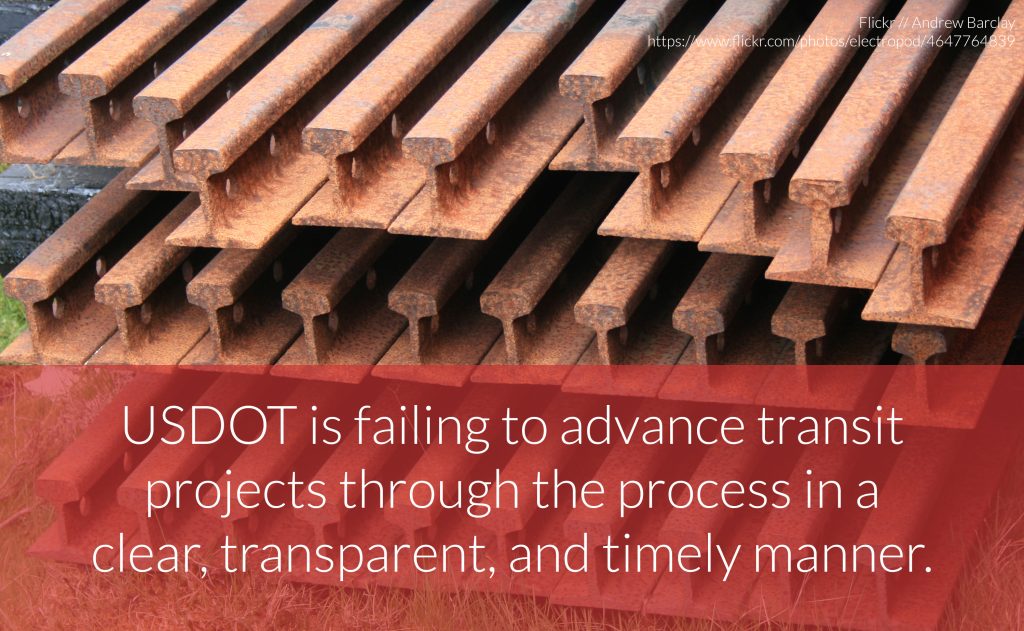
Instead of approving projects and providing the money cities have applied for, USDOT is “allowing” cities to move ahead with construction on transit capital projects and incur costs that might one day be reimbursed by USDOT.

A few weeks ago, Streetsblog LA reported that Metro in Los Angeles had received a letter from USDOT that allows them to proceed with construction on their Purple Line subway westward toward the beach. (Bold type ours):
At this morning’s Metro Construction Committee, CEO Phil Washington announced that Metro had received a federal letter of no prejudice (LONP) for construction to proceed on the third phase of the Westside Purple Line. Washington aptly described this as a “big deal,” as this was the first major transit project that this administration has approved to proceed to the federal New Starts engineering phase. The federal letter of no prejudice covers an initial $491 million, nearly all for tunnel construction. The LONP guarantees that the feds will reimburse the local expenditures under a forthcoming full-funding grant agreement (FFGA).
Guarantees? Not quite. Los Angeles is right to treat this as a positive development, but these types of letters do not guarantee any federal money for transit projects.
Here’s what Obama’s USDOT said about these types of letters in a batch of policy guidance from early 2017, just before the transition:
Pre-award authority is not a legal or implied commitment that the subject project will be approved for FTA assistance or that FTA will obligate Federal funds. Furthermore, it is not a legal or implied commitment that all items undertaken by the applicant will be eligible for inclusion in the project. …Federal funding…is not implied or guaranteed by an [Letter of No Prejudice.] (pp 20, 22.)
By starting construction on this project without the full guarantee of funding, LA Metro is taking a risk, but they are still making a pretty rational decision. Just like the other cities with transit projects in the pipeline, Los Angeles is fully expecting that USDOT will do their job as required by law—something they’ve always done—and approve projects in a timely matter in order to obligate the $2.3 billion Congress provided in 2017 and 2018.
LA has a project with expiring construction bids due to USDOT’s delays up to this point, is on a tight timeline to have service running in time for the 2028 Olympics, and has already raised billions in local funds to pay their share.
Under previous administrations, whenever a city received one of these letters, their project was typically approved. So why should anyone be skeptical when this USDOT provides these letters? Here are two reasons:
- This particular administration at USDOT has no established track record of advancing multi-year transit projects. If they were sending out these letters at the same time as they were routinely signing other grant agreements and obligating dollars to other multi-year transit projects, there would certainly be a level of trust established, as has been the case with previous administrations.
- This administration has gone on the record multiple times asking Congress to provide them with zero dollars for multi-year transit projects that don’t yet have signed funding agreements — projects just like those in Los Angeles and Minneapolis, a region that is also awaiting final approval.
Cities are only in this difficult position because USDOT has failed to advance transit projects through the process in a clear, transparent, and timely manner.
While USDOT will hopefully approve LA’s project and award them funding, possibly before the end of this year, what about the other cities who are a little further behind in the process?
On the one hand, you can get a letter from USDOT that says you’re free to proceed and spend your own dollars on a big-ticket transit project, and that they won’t “prejudice” the eventual review of your application with the fact that you started building a project that wasn’t yet fully approved.
On the other hand, this administration at FTA and USDOT has twice asked Congress to eliminate all transit capital dollars, save for the money they’re already on the hook to provide for the projects that have pre-existing funding agreements.
Los Angeles is in a position where they can spend their own money to get started, counting on USDOT to (eventually) follow the law and award the money Congress appropriated. But other smaller cities or cities with more tenuous local funding might not be able to spend millions with the non-binding promise that they’ll eventually be reimbursed.
USDOT is creating an unnecessarily risky situation for cities. If you are one of the cities that’s ready or nearly ready but awaiting funding from USDOT, why trust a non-binding letter from an administration that’s already asked Congress to appropriate zero dollars for your project in the budget?
We’re eager to give credit to FTA when it’s due and they get these projects moving, but that time hasn’t yet arrived.
A bipartisan effort to help states and metro areas determine if their transportation systems get you there
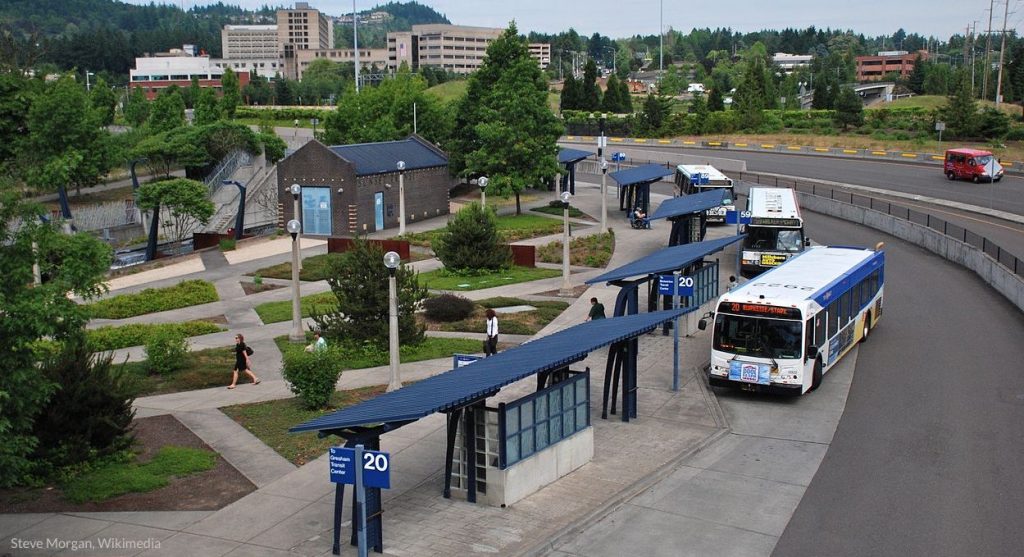
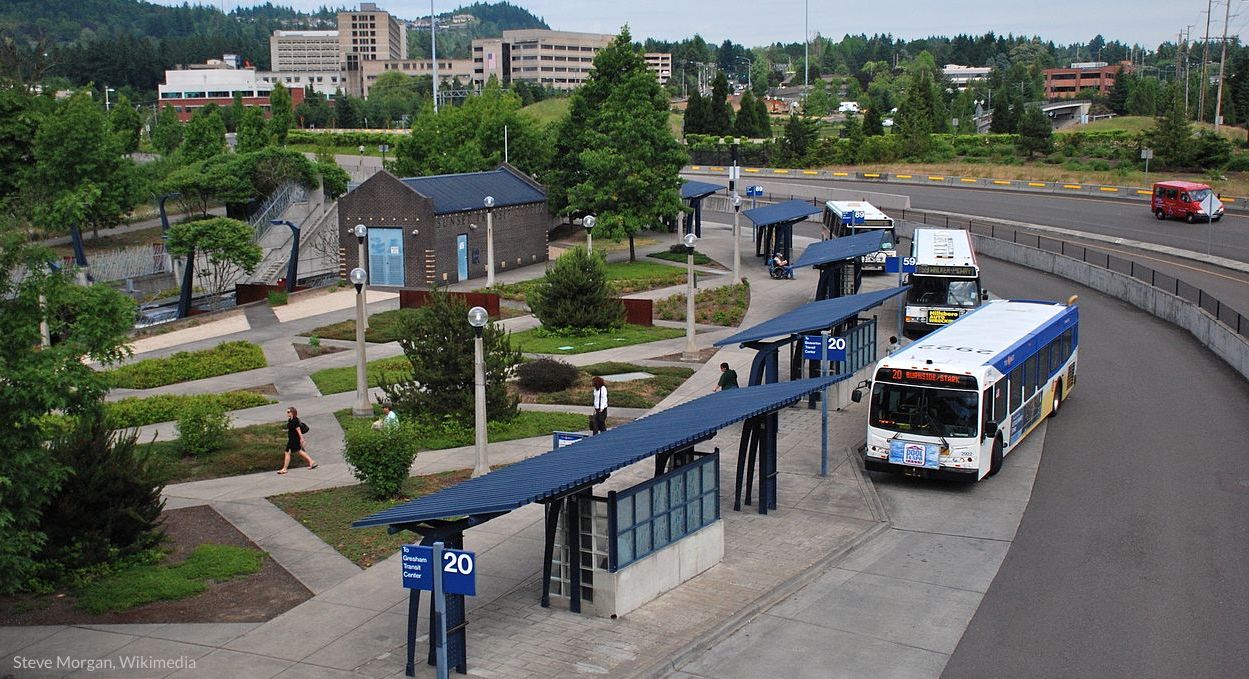
Providing states and metro areas with powerful data and accessibility tools can help them better measure the destinations that their residents can easily reach, equipping transportation agencies to more effectively plan investments that will help address those gaps.
In late September, Senator Baldwin (D-WI), along with cosponsors Senators Ernst (R-IA), Hatch (R-UT), and Markey (D-MA), introduced bipartisan legislation to provide communities with new state-of-the-art data tools that can be used to better assess how well their transportation networks provide access to jobs and daily needs.
S. 3491, the Connecting Opportunities through Mobility Metrics and Unlocking Transportation Efficiencies (COMMUTE) Act, requires the U.S. Department of Transportation (USDOT) to create a pilot program to provide a handful of states, metropolitan planning organizations, (MPOs) and rural planning organizations with data sets to calculate how many jobs and services (such as schools, medical facilities, banks, and groceries) are accessible by all modes of travel.
These data tools can be revolutionary for communities, enabling them to take a truly holistic view of their transportation networks and make more informed planning and project selection decisions. Why?
As we noted when a similar bill was introduced in the House last year, connecting people to work is arguably the most important goal for our transportation system that we generally do a pretty poor job of measuring. But as important as measuring jobs access is, only 20 percent of all trips and only 30 percent of vehicle miles traveled (VMT) are to and from work. This means that 80 percent of trips (70 percent of VMT) are for our other daily essentials—going to the store, visiting the doctor, dropping the kids off at school, etc.
The incredibly blunt metrics that most planners or communities have access to, like overall traffic congestion and on-time performance for transit, paint a grossly two-dimensional picture of the challenges people face while trying to reach their needs within a reasonable period of time. And these limited measures certainly don’t provide enough information to help these agencies make the hard decisions about what to build to best connect people to the places they need to go.
The use of these simple metrics results in the consideration of simple “solutions,” like adding expensive lanes to existing highways and road networks—costly solutions that often don’t solve the problem, or make it worse.
But today, there are precise new tools available that allow communities to more accurately calculate accessibility to employment opportunities, daily errands, public services, and much more, and then optimize their transportation networks and utilize all modes of transportation. (Like the tools used to evaluate Baltimore’s bus system overhaul, for example.)
But unfortunately, states and MPOs must pay for this more helpful accessibility data while the less useful congestion data is made readily available to them. This bill could start to change that by creating a pilot program that will give a handful of states, metro areas, and rural areas free access to the data, helping them make better use of their limited taxpayer dollars to bring the greatest benefits.
With the introduction of this bill, there are now bipartisan bills in both chambers of Congress to provide better data to local communities. Each bill is sponsored and cosponsored by members who sit on the committees with jurisdiction over the bills. This represents a tremendous step forward and we’re grateful for the bipartisan leadership of Senators Baldwin, Ernst, Hatch, and Markey.
Cities left in the dark by an agency that once partnered with them to build new transit
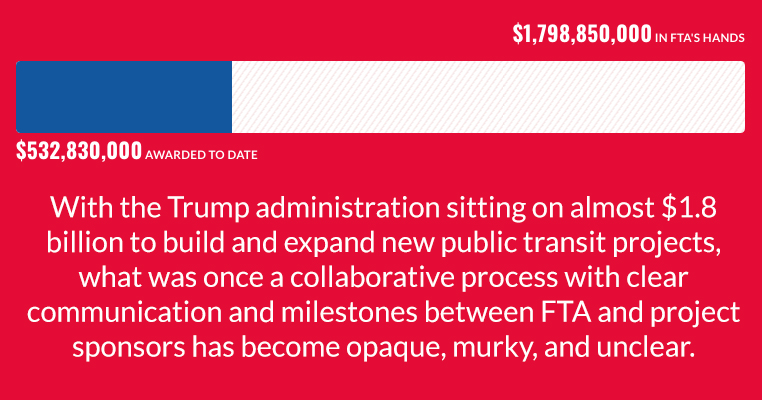
Many local transit project sponsors are in the dark about the status of their applications for federal transit funds, left to wonder why the Federal Transit Administration (FTA) has not granted funding to their projects. But these cities have remained publicly quiet about it for fear of harming their chances of eventually receiving funding, taking the pressure off the administration to fund and support transit projects.

As we have previously identified, the Trump administration is sitting on almost $1.8 billion to build and expand new public transit projects. What was once a collaborative process with clear communication and milestones between FTA and project sponsors has become opaque, murky, and unclear.
For this reason, over the last few months, we at T4America have spent some time interviewing the majority of these communities. While each community’s story is unique and none wanted to go on the record, several common themes emerged:
- A lack of transparency
- Unexplained delays from FTA over processing final paperwork, most often connected to political offices within USDOT
- FTA’s poor communication and slowed-down process is leading to potential delays and cost increases for local taxpayers
- Not all projects have faced delays
1) A lack of transparency
Both of President Trump’s budget proposals so far have asked Congress to provide zero dollars for new transit projects. FTA has cited these budget requests (twice rejected by Congress) as a rationale for breaking with precedent and no longer providing Congress (and the public) with annual reports clearly detailing which new projects would receive funding that year, if Congress appropriates the dollars (which Congress has done.) This lack of transparency has eliminated local project sponsors’ ability to point to their project in these annual reports and, therefore, hold FTA accountable for keeping to their timeline.
In addition, FTA has privately told some project sponsors that the failure of the Wave Streetcar project in Ft. Lauderdale, FL, required them to delay other projects, ostensibly to evaluate the risk of cost increases. According to a number of communities, FTA staff communicated that they would not sign new grant agreements for a period of months after the Wave Streetcar failure. But FTA has done nothing to explain (to the public or sponsors) precisely how the failure of a single project in Florida has any bearing on other projects in other states that have been advancing through the pipeline. Further, while the Wave Streetcar is certainly a failure in that it is not being built, the federal government never lost a dime on the project—a win for the process from their standpoint.
2) Unexplained delays from FTA over processing final paperwork, most often connected to political offices within USDOT
Several local project sponsors we spoke to described many months of bizarre hurdles and unexplained delays. In virtually all instances, project sponsors described helpful and productive conversations with the career FTA staff, which were subsequently undermined by kafkaesque levels of bureaucracy within the offices of the Secretary and Deputy Secretary at USDOT. One community described regional FTA career staff informing them that they just didn’t know why their project was delayed. Ultimately, it took personal inquiries from their House and Senate delegations before FTA provided information and ultimately advanced the project.
Another community described productive conversations with regional career staff until the project was elevated to the USDOT Secretary’s office, at which point communication stalled, and the project was inexplicably delayed for months. Again, personal involvement by their House and Senate delegation was required to get the project moving again.
Ultimately, it appears that high-level political influence is the only surefire method for finally advancing a project, as happened with the Caltrain electrification project approved early last year, where members of the California congressional delegation wrote to Sec. Elaine Chao, and/or set up meetings with her or her staff.
Still other sponsors described situations where FTA staff who would highlight flaws in an application without providing instructions or a timeline for addressing them. Imagine taking your car to the mechanic and being told only that the car is broken, leaving you on your own to guess what’s wrong with it. This has resulted in countless wasted hours attempting to understand the flaw, guessing at what FTA would consider an acceptable solution, and having multiple conversations with FTA staff to present updated applications. Under previous administrations, the FTA was a partner, cooperating with cities to both put together the best possible projects and help actively shepherd them through the process toward receiving funding and getting built.
That is clearly no longer the case.
3) FTA’s poor communication and slowed-down process is leading to potential delays and cost increases for local taxpayers
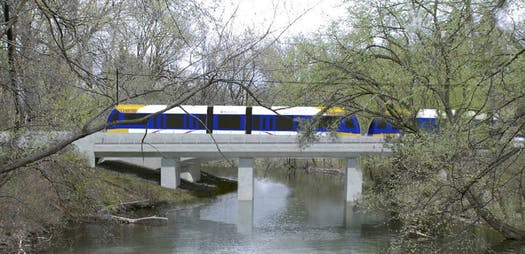
The two major construction bids for the SW light rail project in Minneapolis expired at the end of September while the agency waited for word from USDOT & FTA.
For many localities, the delays described above have affected project sponsors’ contracting schedule, either jeopardizing their ability to pay contractors or delaying their ability to award contracts (leading to cost increases). In Los Angeles, some construction bids were set to expire in early October. In Minneapolis, where they were hoping to begin construction this fall on the SW light rail extension before the weather gets harsh, their biggest construction bids expired at the end of September as they awaited word from FTA. (One bidder has given an extension, the other has not.) Both cities are still waiting for approval from FTA to fund their projects.
Several localities described cost increases associated with these delays. And one community described a prime contractor that was turning away work because it was committed to working on their project, yet the locality was unable to pay the contractor because its grant was delayed.
To address this issue, some localities have requested something called letters of no prejudice which allows them to begin spending their own money on a project and later receive reimbursement from FTA (if they are awarded a grant). But these letters are really a formality, providing zero guarantees from FTA that their projects will ever be approved. In this scenario, these communities are spending more local money up front for aspects of a project that should have been funded by a federal grant. By delaying and refusing to sign grant agreements, FTA is putting the onus on locals to spend more money to keep these projects alive while waiting for FTA. This is occuring all while FTA is often unable to articulate what is standing in the way of their approval.
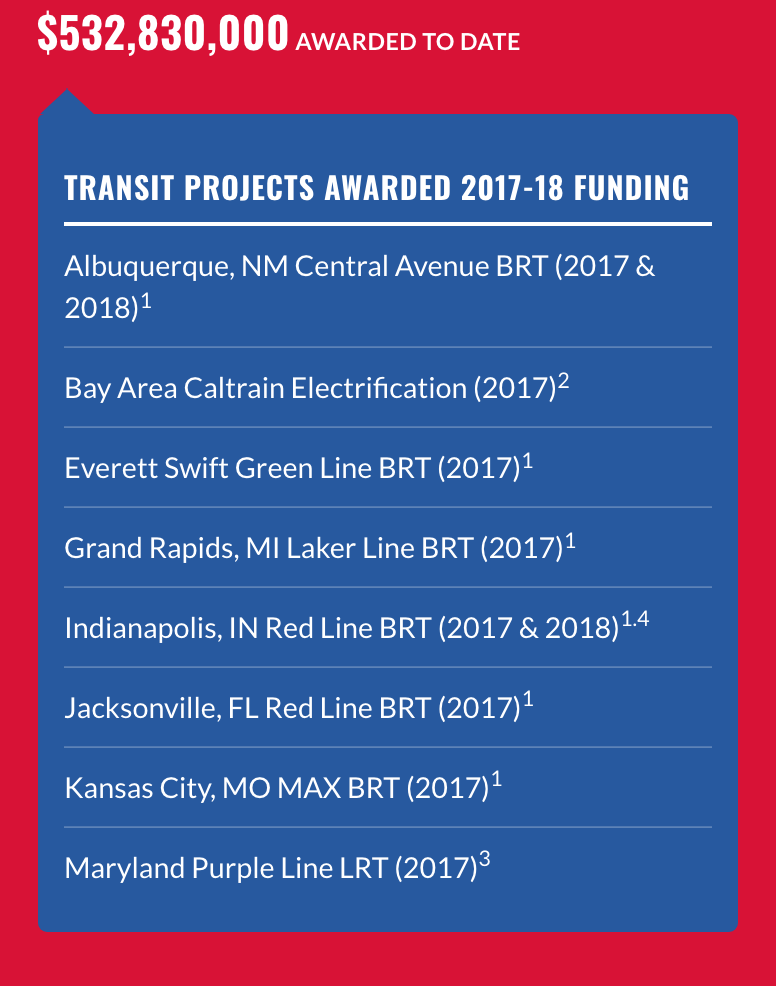 4) Not all projects have faced delays
4) Not all projects have faced delays
Finally, in the interest of fairness, we note that not all projects have been delayed. A small number of localities we spoke to have described a consistently productive relationship with FTA, and this is indeed good news. Unfortunately, the overwhelming majority of communities are either waiting or are unclear about the status of their projects.
And this is also true: USDOT has yet to approve a major multi-year full-funding grant agreement for a larger rail transit project, after signing two early in 2017 that were largely processed by the previous administration. All of the other approvals thus far have been small or single-year projects that don’t come with future fiscal obligations for FTA — an important distinction considering the fact that they’re likely to (once again) only ask Congress for enough money to fund the in-progress projects for which FTA is legally required to continue funding.
And the numbers do not lie. FTA is sitting on almost $1.8 billion dollars. How much longer must communities wait?
Alex Beckmann and Stephen Lee Davis contributed to this post.
How cities can reduce traffic instead of just ensuring more of it
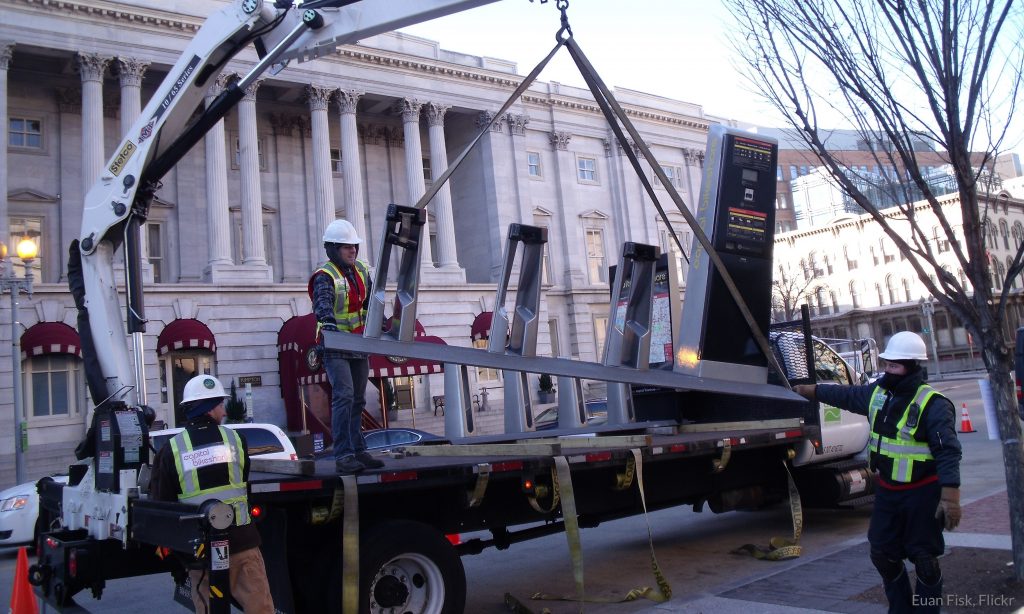
 A developer paying the cost to install a new bike share station could be a way to gain credits toward a building permit under the plan outlined in Modern Mitigation. (Image: Euan Fisk, Flickr)
A developer paying the cost to install a new bike share station could be a way to gain credits toward a building permit under the plan outlined in Modern Mitigation. (Image: Euan Fisk, Flickr)
A new approach to addressing the potential transportation impacts of new development in urban areas, outlined in a new report by the State Smart Transportation Initiative (SSTI), another program of Smart Growth America, could be a powerful recipe for reducing the demand for driving, while helping create more prosperous transit- and pedestrian-friendly cities.
For decades, most local, regional, and state governments have had a myopic approach to handling the transportation needs related to infill development: they require developers to add more street/road capacity. And this single-minded approach has produced exactly what one might expect: Lots of new, expensive roads that actually increase driving, and with it pollution, emissions, roadway deaths, and impediments for people trying to get around without cars.
A more productive approach seeks to minimize traffic from development before resorting to just building expensive, bigger and wider roads. This new report from SSTI outlines a modern method for cities and the private sector to partner together in reducing the demand for driving as cities build, grow, and thrive.
On October 29 at 2:00 p.m. ET, join Eric Sundquist, SSTI Director; Ramses Madou, Transportation Planner with San Jose Department of Transportation; and moderator Beth Osborne, Senior Policy Advisor at Smart Growth America for a lively discussion of the opportunities and challenges of moving from LOS to VMT and what steps are needed to make this shift work.
Cities conventionally manage the impacts of development by adding capacity for automobiles, often providing no support for anyone outside of a vehicle. But this strategy only encourages more driving, and the roads and city in general become much less pedestrian-, bicyclist-, and transit-friendly. It also creates more emissions at a time when many cities are trying to reach ambitious climate goals.
It’s a self-fulfilling prophecy: If we think of accommodating more driving as the only solution, it will inevitably get harder for people to walk or take transit, and more trips will be taken in cars.
Cities thrive with a concentrated mix of people and uses—the more jobs, people, and activities within reach of each other, the greater the economic benefit from being able to easily access all of this opportunity. Asking developers to provide services and amenities that allow people to move around with fewer car trips will reduce the traffic impacts of new development, benefit all, and will help cities avoid super-sizing our roads and intersections.
This report offers a way to do this within the city development process.
What would a better approach look like?
This new report—Modernizing Mitigation—suggests a system that rewards developers for a range of transportation improvements they can provide, making them partners in an effort to produce people-friendly neighborhoods. Actions developers can take include improving the infrastructure for walking, biking, or transit; providing complementary land uses that minimize the need for new trips; subsidizing other forms of mobility like bike sharing or car sharing; or providing first- and last-mile connections to high-capacity transit (like a regular shuttle).
 Changes to the pedestrian network and the improvement of crosswalks to add connectivity (left) and accessibility improvements from these connections (right) can be quantified in order to provide mitigation credits.
Changes to the pedestrian network and the improvement of crosswalks to add connectivity (left) and accessibility improvements from these connections (right) can be quantified in order to provide mitigation credits.
The contributions would be scaled to the amount of parking provided. The more parking a developer provides, the more they’d have to do to reduce demand (or through in lieu fees for non-auto services and facilities.) Or a project with no parking could be exempt from the other measures.
This helps produce a city where development can be seen as a positive contributor to a more prosperous place, rich with opportunities for all, as opposed to just the culprit to blame for more traffic.
This new approach can help put cities and developers on the same team, rather than working against one another to produce all the wrong outcomes. The report includes an examination of different cities’ policies along these lines, as well as a detailed look at precisely how this system could work with a real scale of points and incentives.
Much of the report was the product of SSTI’s practical work with the City of Los Angeles to develop a system for LA, but the suggested point system and requirements could be easily adapted by any other city to their local environment, priorities, or goals.
Download the full report and join us for the webinar on October 29.
Lyft is paying people to ditch their cars. Will it work?
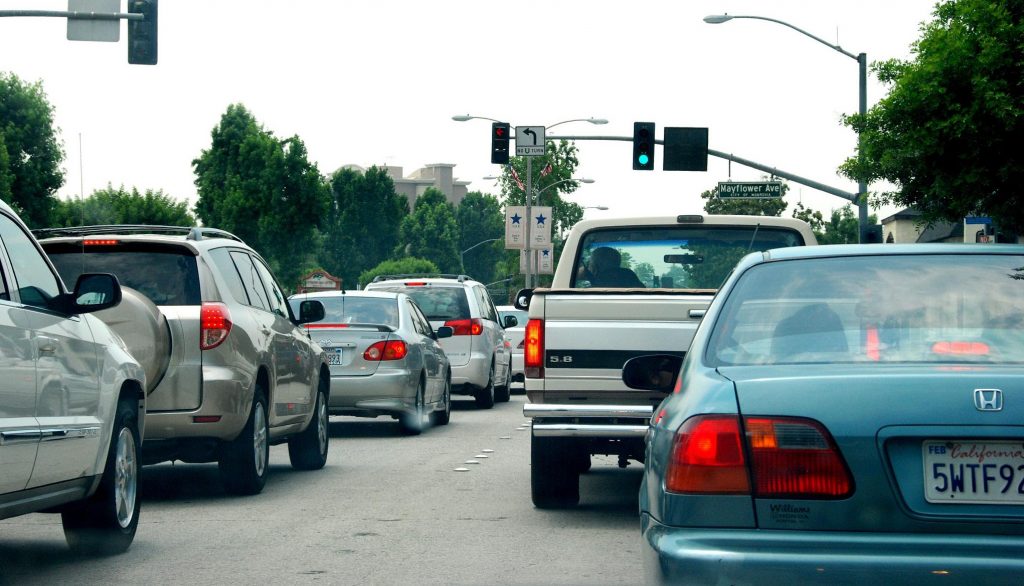
Lyft recently expanded its “ditch your car challenge” to 35 new cities, offering residents credits for transit and various shared mobility services in exchange for giving up their car for one month. Whether this will be good for cities, and what role they should play in it, remains an open question.
This year, companies such as Uber and Lyft have begun to buy and partner with other mobility services in an effort to shift away from an exclusive focus on ridesourcing and rebrand themselves as mobility platforms providing a broad array of services. Both acquired bikeshare companies in the past year—with Uber buying Jump and Lyft buying Motivate—and both are either deploying or integrating scooters into their apps along with putting a greater focus on public transit. This trend toward consolidating services points toward a future where companies offer a suite of options under their app, easing connections between different service types and becoming a one stop mobility shop.
As this trend continues, it points to the larger question of the appropriate role that cities and transit agencies should play as they work to manage a transportation network made up of both public and private providers. And, how should this role change in an environment where there’s possibly one or two companies providing all of the non-transit services in the region?
Cities will begin to see this firsthand soon through Lyft’s “ditch your car challenge,” launched in Chicago in August. Through this challenge, in return for pledging to give up their car for one month, Lyft provided 100 residents with $550 in credit for Lyft trips, public transit, bikeshare, and carshare. This included $300 in Lyft credits, $105 for L bus and train service, $45 for a Divvy bikeshare pass, and $100 in Zipcar credits. Based on the positive results from this pilot, Lyft expanded the challenge to 35 additional cities in the U.S. The list of cities includes a wide variety of communities with varying levels of car ownership and transit access, such as Richmond, VA, Orange County, CA, Washington, DC and New York City. The stated purpose of Lyft’s challenge is to convince people to get rid of their cars by highlighting the high cost of personal car ownership and enabling access to a suite of cost effective and more sustainable transportation services.
Redefining the user experience
Lyft’s challenge is the first major attempt in the U.S. to test out a variation of Mobility as a Service (MaaS). The idea behind MaaS is to create a single access point for a suite of mobility options. This can be offered either as a subscription service or as a pay-as-you-go model. In its most developed form, MaaS allows users to plan, pay, and take trips across a number of different services, such as transit, bikeshare, scooters, Uber or Lyft, carshare or any other transportation service through a single user interface.
The first permanent MaaS deployment took off in 2016 in Helsinki. Through Whim, a consumer-facing app developed by MaaS Global, residents can access taxis, transit, car rental services, and bikeshare for a single monthly fee, with different pricing packages depending on the level of services they want, along with a pay-as-you-go option. As of July, Whim had 45,000 users in Helsinki, with 5,100 paying monthly fees. This spring, Whim also launched in West Midlands, UK, offering similar mobility options throughout the region. Other MaaS services, such as Ubigo in Sweden, have also launched pilots and are planning for full launches as well.
While Lyft’s challenge does not provide all of these services in one interface and, depending on the market, only covers one or two additional mobility services, it serves as a basic MaaS model for users, and Lyft, to test and explore. While the challenge is largely focused on car ownership and convenience, it’s also to market its available offerings and learn about how to refine these services in the future.
What’s the role for cities?
If it’s a viable model, MaaS can have clear benefits for cities, including easier access to different mobility services that may result in reduced congestion, emissions and travel time. There’s a lot for cities to consider as they think about these platforms, but as with many challenges facing them, they’ll need to use their current goals around equity, safety, congestion, or others as a guide.
Single-occupancy vehicles are the problem
Despite success in how these platforms have been tested in European cities, and their eventual plans for expansion, they’ve only been tested in dense urban environments with a strong culture of public transportation and an existing suite of readily available mobility options. In these places, residents are accustomed to being able to move from one place to another car-free without much hassle, and MaaS allows them to more easily and seamlessly take advantage of every aspect of their existing options.
But in many American cities where driving is the norm, public transit isn’t reliable or built into most people’s transportation habits and active transportation options aren’t always readily available, this type of program is much less likely to take hold as quickly. The real challenge in these communities is getting people out of their cars, especially when they drive alone, and into more sustainable options.
While Lyft has offered ride credits exclusively for shared rides in some communities, in most of their test cities, Lyft credits aren’t dedicated toward shared rides. So, in those places where more sustainable options aren’t nearly as robust as they should be, this program could simply result in participants switching out of their own car and into one being driven by someone else. While they’re out of their own cars, they’ll still be taking trips alone, which won’t help reduce congestion or solve the problems caused by single-occupancy vehicles.
Multimodal transportation should be the top priority
Understanding this, cities can’t put the cart before the horse: they need a flexible, multimodal transportation system before an app can enhance it, not the other way around. MaaS may provide better connections and access between modes, but cities will still need to ensure those other options are available in the first place, by providing them on their own or through private sector partnerships. As Lyft helps pull people away from car ownership, cities should work to ensure they’re moving toward these other services, instead of simply replacing one car trip with another car trip.
Adopt policies that incentivize sharing and help achieve outcomes
In order foster this type of modal shift, cities will need to pass policies that incentivize the travel behaviors that actually contribute to their long-term goals. While cities can’t control every aspect of how these companies operate, they should understand the various carrots and sticks at their disposal to encourage shared, active, and carbon-free transport. This could include providing dedicated curb space for pickups and drop offs for shared or pooled rides, rather than private ones, creating dedicated lane space for shared vehicles and transit, or creating new pricing mechanisms that truly accounts for the benefits and impacts of various modal choices.
Require data from providers
As part of this, cities should ensure they can use the data these platforms produce. MaaS could put all available services under one umbrella, allowing cities to gather additional data on how each service is operating and how they’re interacting with one another, creating opportunities for better transportation planning. But, odds are they won’t get this data, as some of these platform companies haven’t freely shared data on their operations. Cities are getting valuable data from shared active transportation companies today, but this movement towards mobility consolidation raises the question of whether cities will continue to get these data once they’re acquired or included under a larger MaaS platform. To be sure, cities should adopt data sharing standards for every provider and service that will allow them to better understand these services are being used and how they themselves will need to evolve as a result.
Like many aspects of smart mobility, MaaS isn’t a silver bullet that will fix a city’s transportation challenges. In order to make these successful, they’ll need to stick to their goals and outcomes and consider how these platforms will work for them, not the other way around.
FY19 THUD Continuing Resolution and Bus Grants
On September 28, President Trump signed H.R. 6157, the FY19 Department of Defense and Labor, Health and Human Services (HHS), Education appropriations bill, which also includes a Continuing Resolution (CR) to extend government funding at FY18 levels through December 7th. The CR covers any appropriations bills not enacted before October 1, 2018, which includes the Transportation, Housing and Urban Development (THUD) bill that funds federal transportation programs.
Also, on September 25th 2018, the Federal Transit Administration announced it was awarding $366.2 million in Bus and Bus Facilities grants to a total of 107 projects in 50 states and territories.
Download T4A’s more detailed policy memo here for more in depth information and analysis.
With the 2018 fiscal year over, how much money has USDOT obligated to transit projects?
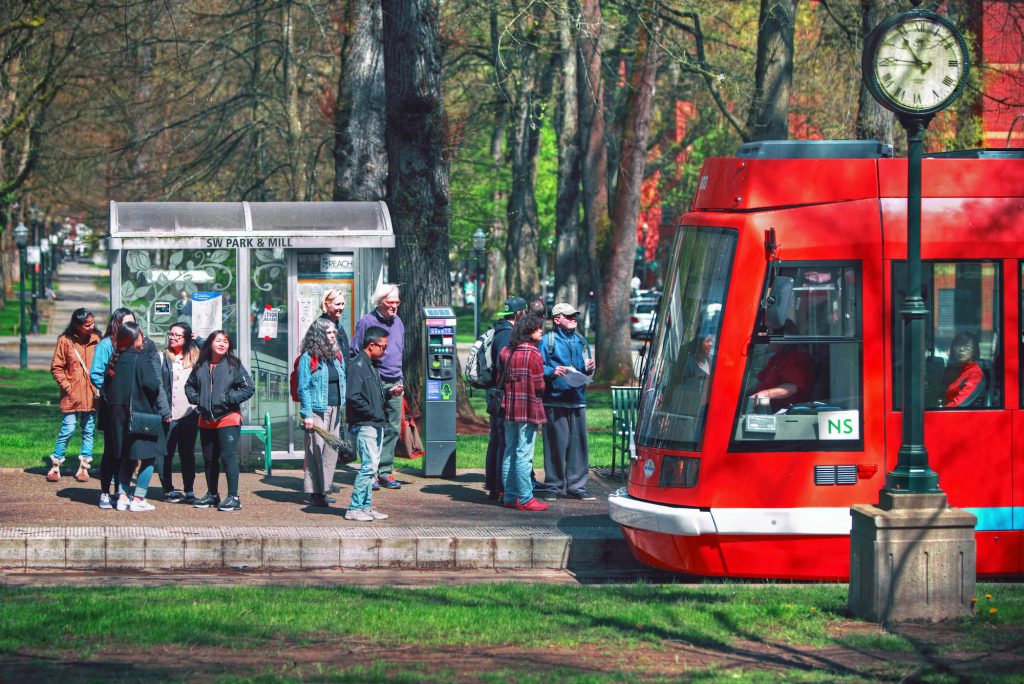
The 2018 fiscal year closed yesterday, wrapping up a year in which USDOT received more than $1.4 billion from Congress to invest in new transit construction and improvement projects across the country. With another infusion of cash for FY 2019 coming (eventually), it’s time for a look at how much USDOT still has on hand from 2018—as well as the unspent funds from FY 2017.
With fiscal 2018 now in the books and 2017 more than a year behind us, USDOT still has nearly $1.8 billion in unspent funds at their disposal from these two years for new transit. They’ve obligated a total of $532 million in 2017-2018 dollars to just eight transit projects, with just $100 million of that from FY 2018.

Perhaps one reason why USDOT has awarded so little of the funding from this year is because they still have almost half of the $925 million that Congress gave them back in May 2017. That fiscal year now closed more than a year ago.
USDOT’s bank account is actually about to get even bigger.
While the 2019 budget is still awaiting final action by Congress, the relevant committees from both chambers have already approved their 2019 budgets for transportation (and housing) programs. And as it stands now, both the House and Senate would infuse the transit capital program with more than $2.5 billion. While about half of that money would be for advancing ongoing multi-year transit projects that USDOT already approved, approximately $1.5 billion would be intended to advance new projects in the pipeline that are expecting to sign agreements with USDOT sometime in 2019 or beyond.
Before the end of the calendar year, without advancing any big-ticket transit projects, USDOT could have more than $3 billion on hand to obligate to transit projects.
If this budget is approved by Congress, it will mark the third straight time that they’ve rejected USDOT’s preference to receive zero dollars to advance new transit projects. Remember, this was their request for the 2019 budget (emphasis ours):
The FY 2019 [budget] proposal limits funding for the CIG Program to projects with existing full funding grant agreements. For the remaining projects in the CIG program, FTA is not requesting or recommending funding. Future investments in new transit projects would be funded by the localities that use and benefit from these localized projects.
To hear FTA tell it, they’re wondering what the big fuss is all about. Last week the FTA’s Acting Administrator Jane Williams spoke to the American Public Transportation Association at their annual conference. During her remarks, she expressed surprise at all the hand-wringing about FTA’s signature transit program:
Unfortunately, the administration’s efforts to support our nation’s infrastructure are many times overlooked by the focus on the Capital Investment Grants (CIG) Program. I know a lot of you in the room have very strong opinions about this administration’s approach toward the CIG program. Even though this program represents less than 20 percent of FTA’s budget, it seems to occupy 80 percent of the attention.
A huge share of FTA’s funds are distributed via formulas—FTA has no discretion to turn off that faucet even if they wanted to. So yes, the public is very interested in the single biggest available federal funding stream to pair with billions raised by local taxpayers to advance new transit projects across the country. Leaders in places like Atlanta might understandably be wondering about the future of their ambitious $2.5 billion transit plan that hinges on receiving funding from a program that USDOT would prefer Congress wind down.
Hmm…have Atlanta transit and elected leaders realized that this USDOT currently wants to wind down the very program they’re counting on to pay for a big share of these projects? https://t.co/2IfixjXgEy pic.twitter.com/qf9lBVayRv
— Transport. 4 America (@T4America) October 1, 2018
Further on in her remarks, Acting Administrator Williams claims credit for projects that they actually haven’t funded yet:
In fact, in just the last six weeks…
- Allocated $100 million in funding toward our planned multi-year FFGA for the Seattle Lynnwood Link Extension light rail line, and
- Allocated $99 million in funding toward our planned FFGA for the Santa Ana, California streetcar project.
USDOT has not yet signed funding agreements nor obligated any funds to the Lynnwood (WA) Link light rail project and the Orange County (CA) Streetcar. Claiming credit for “allocating” funding to them is like telling your kids that they need to write thank-you notes for the presents they might get for Christmas, if they’re good.
Congress isn’t likely to act on the 2019 budget before the November elections—the president signed a continuing resolution to fund the federal government through December 7—but when they do, they’ll be filling up the USDOT purse with yet more funding for transit. Stay tuned.
The hosts of Capital Ideas 2018 are working together for a more connected Atlanta region
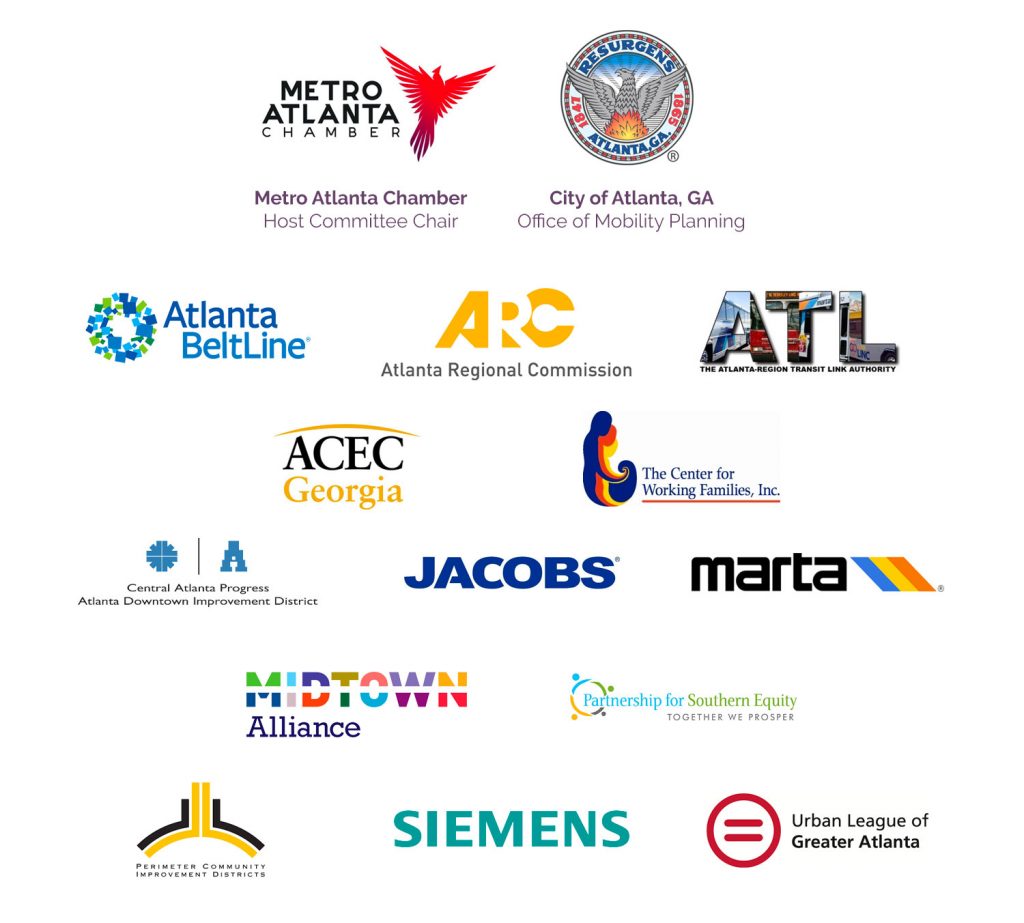
Atlanta, GA isn’t just the location of Capital Ideas 2018 — the region itself is part of the agenda.
Atlanta’s work to build a more walkable, bikeable, transit-accessible city has lessons every city can learn from. Expanding their transit system, creating multi-use trails, investing in light rail, expanding bike share, funding bus rapid transit, and raising new funds for projects in the future are just some of the Atlanta region’s recent successes.
This work takes partnership, and we are proud to have more than a dozen organizations working for a more connected Atlanta region serving as our Host Committee for this year’s conference.
The full committee includes the Metro Atlanta Chamber of Commerce (our Host Committee chair), the City of Atlanta’s Office of Mobility Planning, Atlanta Beltline, Atlanta Regional Commission, Atlanta-Region Transit Link Authority, American Council of Engineering Companies of Georgia, Center for Working Families, Inc., Central Atlanta Progress, JACOBS, MARTA, Midtown Alliance, the Partnership for Southern Equity, Perimeter Community Improvement Districts, Siemens, and the Urban League of Greater Atlanta.
You might notice that several of these organizations do not work directly on transportation. Why is state transportation policy important to them?
“Ensuring modern, multimodal and well-maintained transportation infrastructure is essential to the long-term quality of life and economic vibrancy of Downtown Atlanta. We are focused at the hyper-local level to encourage targeted transportation investments, policies, and programs that strive to balance jobs and housing in Downtown, support Downtown attractions and events, and promote equity. As a bridge between the Atlanta’s private sector business community and local government, we convene people, catalyze change, and provide leadership for mobility issues facing the center city.” — Central Atlanta Progress
“The Atlanta metropolitan region’s inadequate state of transportation infrastructure, access, and funding exists largely as a result of a legacy of detrimental policies deeply rooted in race and class. The Partnership for Southern Equity (PSE) believes that an equitable approach to transportation requires the collaboration of all governments within a region, including state government, and coordinated transportation and land use planning. PSE seeks to offer equitable and innovative approaches to regional transportation in order to confront the Atlanta metro’s inequitable, racialized past and to create the conditions necessary for shared prosperity.” — Partnership for Southern Equity
Join us in Atlanta in December to learn about creating cross-sector partnerships for transportation innovation in your own state. Register for Capital Ideas 2018 today.
T4America joins a parade of letters to USDOT urging them to do their job and get transit projects moving
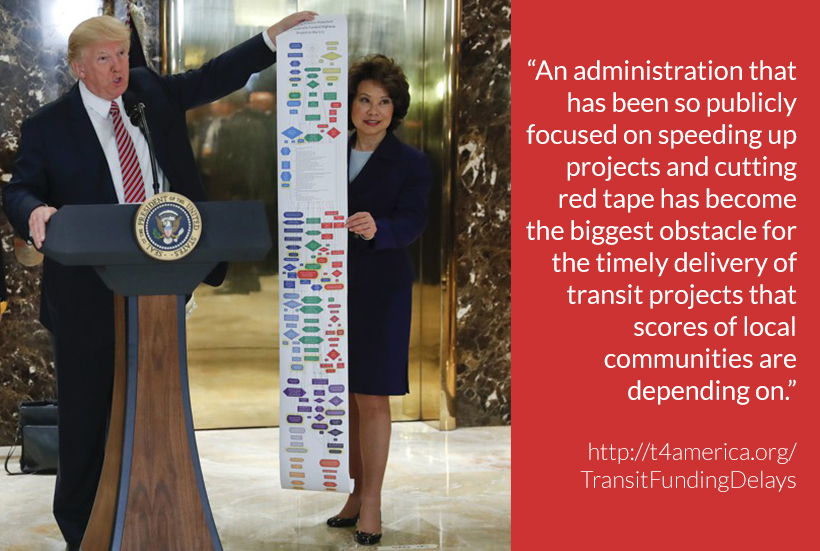
Following a parade of official letters from elected representatives, T4America sent a letter urging USDOT to do the job required of them by law and award funds to expeditiously advance transit projects, communicate more clearly with local communities about the status of their projects, and recognize that a bipartisan majority in Congress has twice rejected their wishes to eliminate the transit capital construction program. (Updated below.)

As chronicled in our Stuck in the Station resource, the Trump administration’s USDOT has stated their clear preference to wind down the federal program that pairs federal grants with state/local dollars to invest in much-needed public transportation projects in cities of nearly all size across the country.
USDOT has (begrudgingly) continued to award dollars mostly to smaller transit projects that receive their funding all at once in one single year—$50 million here, $50 million there—while largely neglecting to advance and sign any funding agreements for multi-year transit projects with higher price tags that require them to provide a larger amount of funding over multiple years. To date, they’ve awarded just $532 million of the $2.3 billion that Congress has given them since May 2017, a fact that’s impossible to reconcile with President Trump and Secretary Chao’s complaints about the long, arduous, red-tape-filled road to getting transportation projects approved and their promises to expedite that process.
(Update: 9/24/2018: Streetsblog LA reported last week that Los Angeles received what’s known as a Letter of No Prejudice from USDOT to proceed on their Purple Line subway extension. While this is indeed a “big deal,” as described by Metro CEO Phil Washington, it does not provide funding from FTA nor does it guarantee that Metro will receive funding in the future. We’ll have more on what this means later this week.)

Last week, we sent a letter to the Federal Transit Administration urging them to get these projects moving and also bring a degree of clarity and transparency that’s been sorely lacking:
To date, the administration has failed to obligate the overwhelming majority of funding appropriated since FY17. This undermines the administration’s stated goal of cutting red tape and building infrastructure. We therefore urge you to expeditiously advance projects, working cooperatively with project sponsors.
We further suggest that you review your method of communicating the status of projects by providing regular, detailed updates to public and project sponsors. This should include specific information about what remains to advance a project, an expected timeline, and what fiscal year funding will be used for a project.
Congress has rejected the administration’s plan to end the CIG program and, instead, provided the FTA with about $2.3 billion to build new and expand existing transit. Based on the limited information publicly available from your agency, there are 16 projects in 13 communities expecting this funding. While some grants have been awarded, USDOT appears to be delaying many projects while not providing project sponsors with the information they need to address the issues USDOT cites as cause for delay. Congress has been clear: USDOT’s mission is to advance projects through the pipeline and award grants.
Read our full letter here (pdf).
We are not the only ones who have been writing letters to USDOT, however.
With several transit projects already in the pipeline (and more on the way thanks to several recent ballot measures), Washington State’s two Senators and scores of representatives sent a letter to Secretary Chao back in February. In this letter, they outlined the recent timeline for three specific transit projects, pointing to months where projects sponsors were left waiting with no communication or action from FTA, noting that this “emerging pattern of missed execution dates, delays, and seemingly deliberate slowdowns in executing CIG grant agreements that have received Congressional appropriations is extremely concerning.”
“In addition, we note it is in direct contradiction to your commitment to distribute the funding Congress provides the Department,” they continued.
A couple months later, in April 2018, Senator Dianne Feinstein (CA) sent a letter to Secretary Chao with a similar thrust. “Congress has now twice rejected proposals from the Trump Administration to terminate the Capital Investment Grant program and instead has strongly reaffirmed its bipartisan commitment to not only continuing, but actually expanding, the program,” the letter states.
For an administration that wants states and localities to pick up a greater share of the funding burden for infrastructure, Senator Feinstein notes that these transit projects should be a pretty attractive deal.
The federal commitment of funding for these [transit] projects averages only 45 percent of the total costs, far less than the federal share of up to 80 percent on comparable highway projects. These projects deserve the fair and timely administration they are owed by a program that has been duly authorized and appropriated.
Jane Williams, the acting administrator of FTA, responded via a letter to all of Congress this summer, in which she seemed to assert that FTA has a lot more latitude to choose projects than the law would suggest (pdf):
The FTA bases its discretionary funding allocation decisions for the CIG program on a variety of factors including the extent of the local financial commitment, project readiness, and geographic diversity. The FTA also considers the extent value capture, private contributions, and other innovative approaches to project development and delivery are used, including public-private partnerships.
Except that the transit capital program isn’t truly “discretionary,” like the TIGER (now BUILD) grant program is, as an example. And “geographic diversity” as a consideration is not actually anywhere in the current law. Rep. Peter DeFazio and Del. Eleanor Holmes Norton, two members of the House Transportation and Infrastructure Committee, addressed both of these issues in a reply to the acting administrator (pdf):
As you know, the [transit capital grant] program’s statutory language is not like a typical discretionary grant program like INFRA, bus, or ferry discretionary grants. It is a pipeline program where eligible projects that meet the statutory criteria under section 5309 are funding subject only to continued appropriations. …FTA’s letter also attempts to add a new criterion to the [transit capital] program, referred to as geographic diversity. We are concerned that FTA is adding another layer of bureaucracy to discourage multiple transit projects from entering the pipeline from within the same growing urban area or state.
What they’re saying is that if transit projects are entered into the pipeline and meet the criteria in the law and are scored in a satisfactory manner (FTA does have some latitude here), the law dictates that those projects should be approved and funded. Put another way, FTA doesn’t actually get to “choose” which transit projects they want to fund—it is not a truly competitive program.
Rep. DeFazio and Del. Holmes Norton also note the massive cognitive dissonance between an administration that has publicly and loudly committed itself to cutting red tape, and USDOT’s plan to add a whole lot more red tape to a process that’s already far more complicated than it should be.
When you testified before the Committee on Transportation and Infrastructure, you spoke of an intent to ‘streamline permitting to speed up project delivery and reduce unnecessary and overly burdensome regulations.’ Given this testimony, we are confused as to why USDOT appears to be intent on creating new regulatory burdens designed to thwart transit infrastructure investment, in overt disregard of clear Congressional intent.
The message that USDOT is receiving is crystal clear. As our letter says, “we intend to continue to draw attention to these delays until these funds are obligated. Local communities have waited long enough.”
The newest intercity rail system in the country
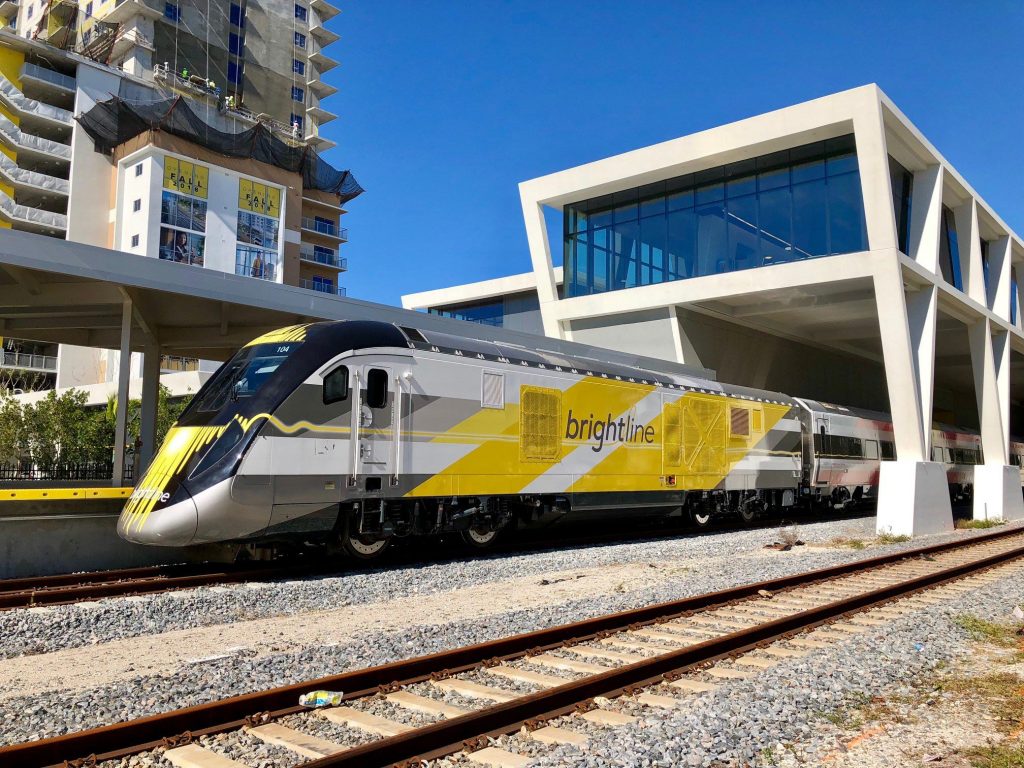
Since it opened earlier this year, the Florida Brightline that connects Miami, Fort Lauderdale, and West Palm Beach has been the only privately owned, operated and maintained passenger rail system in the United States.
Creating the system took collaboration with the Federal Railroad Administration, the State of Florida, and regional economic partnerships, not to mention billions of dollars in private capital.
Now, they’re planning to do it again in California. Earlier this week Brightline announced plans for a new system connecting Southern California to Las Vegas. It will be only the second privately funded passenger rail system in the United States.
Join us at Capital Ideas 2018 to learn how they plan to do it, and about the role states can play in making projects like this happen.
 Rusty Roberts, Vice President of Government Affairs for Brightline, will be one of the featured speakers at Capital Ideas.
Rusty Roberts, Vice President of Government Affairs for Brightline, will be one of the featured speakers at Capital Ideas.
Roberts will share lessons from the Brightline’s work in Florida, ways they are adapting in California, and tips any state leader should know about making innovative projects like this possible.
This session will be just one of the many great conversations in store for Capital Ideas 2018, all about the role states can plan in new mobility frontiers.
We hope you’ll join us in Atlanta in December.
“Deciding what kind of city we want to be” with the Smart Cities Collaborative
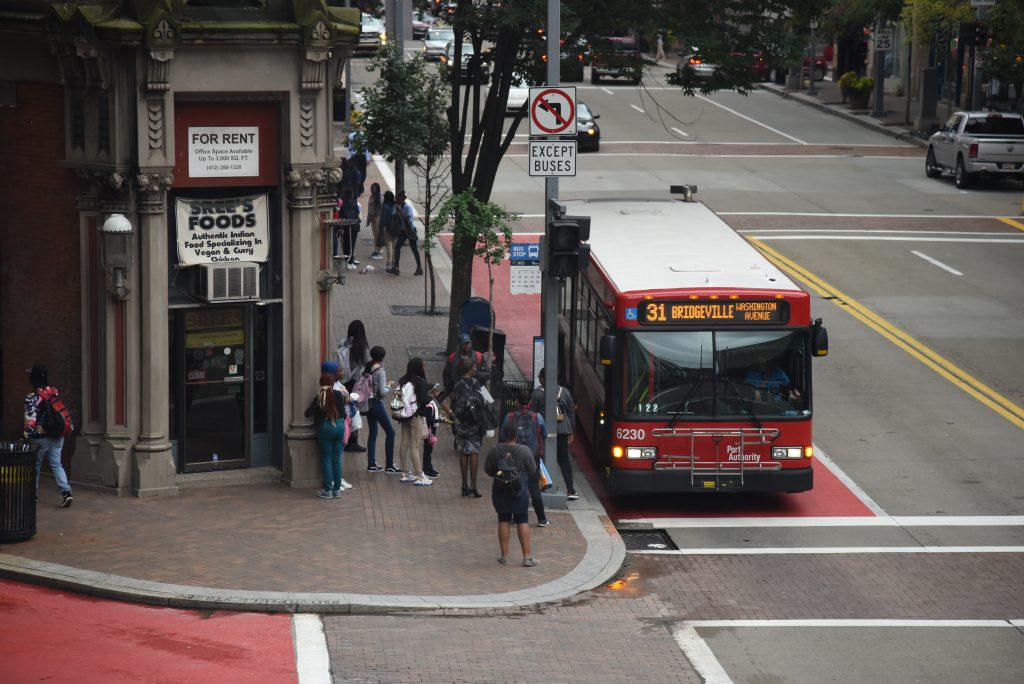
While fighting to stay ahead of a transportation and mobility landscape that changes by the day, 70+ people representing 23 cities gathered in Pittsburgh last week for the third meeting of our Smart Cities Collaborative to band together to solve problems and learn from each other.

While we were in Pittsburgh, Seattle Department of Transportation’s Benjamin de la Peña gave an interview to Seattle Business Magazine about automated vehicles that nails what the Collaborative is all about: “We do not want the technology to decide what kind of city we want to have. We need to decide what kind of city we want and have the technology adapt to that city,” he said.
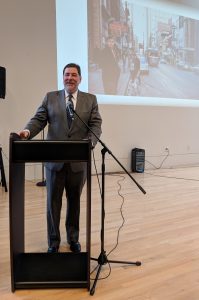
Pittsburgh Mayor Bill Peduto
This is the core mission of the Smart Cities Collaborative, and why we gathered again for three days in Pittsburgh last week. We were incredibly fortunate to have Pittsburgh Mayor Bill Peduto kick things off for us with a stirring reminder of the aim for all of this work, which was embedded in the motto for their application to USDOT’s Smart Cities Challenge from 2016: “If it’s not for all, it’s not for us.”
Thanks to support from AARP’s Public Policy Institute and Jana Lynott, we started trying to put that maxim into practice right out of the gate with a tour of two particular intersections in Pittsburgh that could stand to have some major improvements made to better serve everyone who needs to use them.
As biking rates continue to go up and eventually shared bikes or scooters from companies like JUMP or Lime roll out, the city will continue having to carefully navigate the tension between allowing a market to develop and thrive, while also ensuring that new options also help the city accomplish their very ambitious goals. Goals like eliminating all traffic fatalities (Vision Zero), giving everyone access to fresh food within 20 minutes without having to use a car, and making every trip under a mile most enjoyably achieved by walking or biking, to name just three.
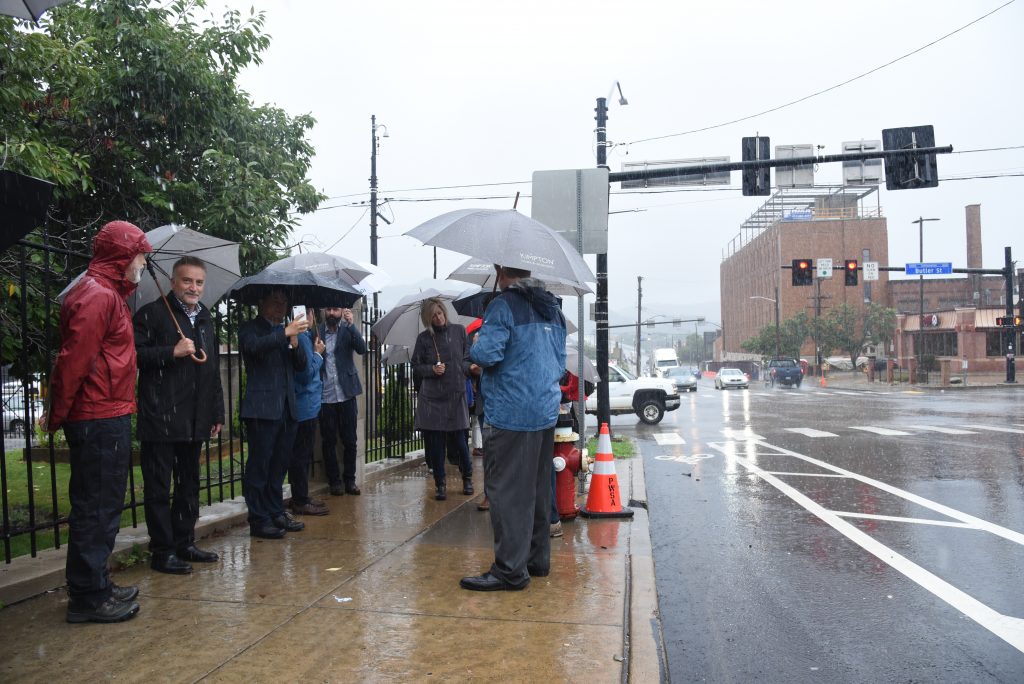
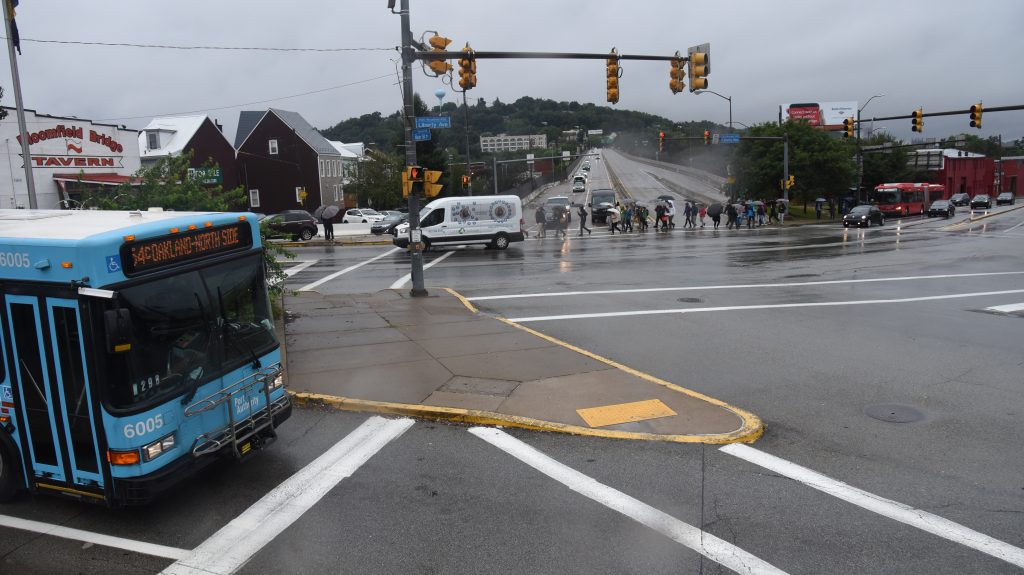
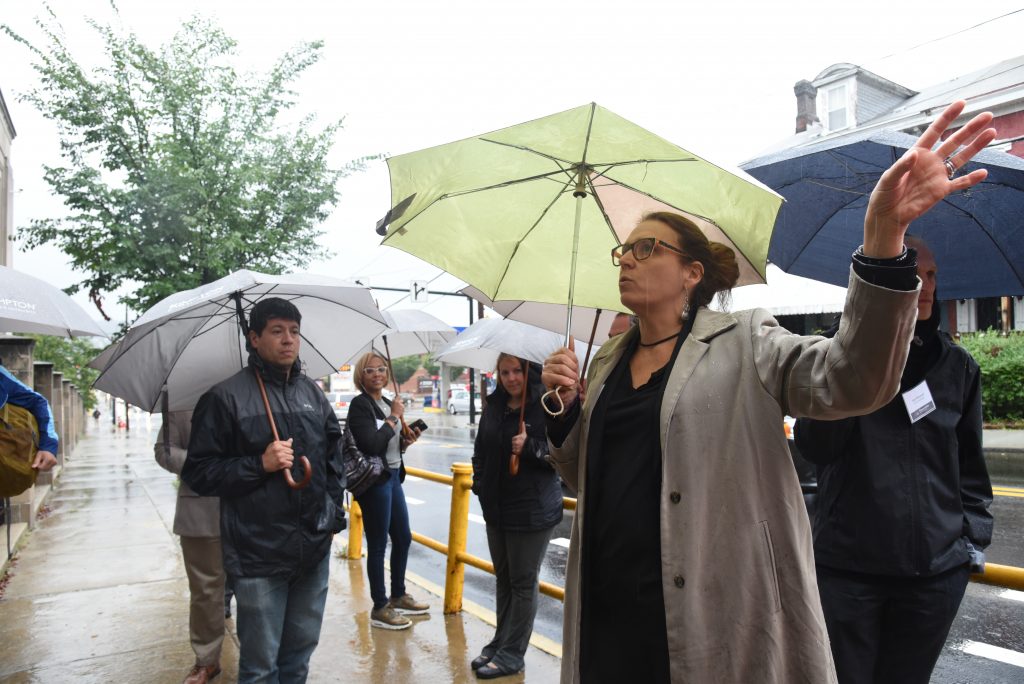
As the rain poured down, Karina Ricks, the director of Pittsburgh’s Department of Mobility and Infrastructure, described some of the challenges with a particular intersection in Pittsburgh to the Collaborative members.
So we toured these two intersections above (during a crazy week of floods in metro Pittsburgh) and then spent some time in a charrette discussing practical design changes for them, the endless tradeoffs that have to be made, and how to prioritize the city’s stated goals and values. How can cities make value-based decisions about what to prioritize? And how do you engage the public when making those difficult decisions?
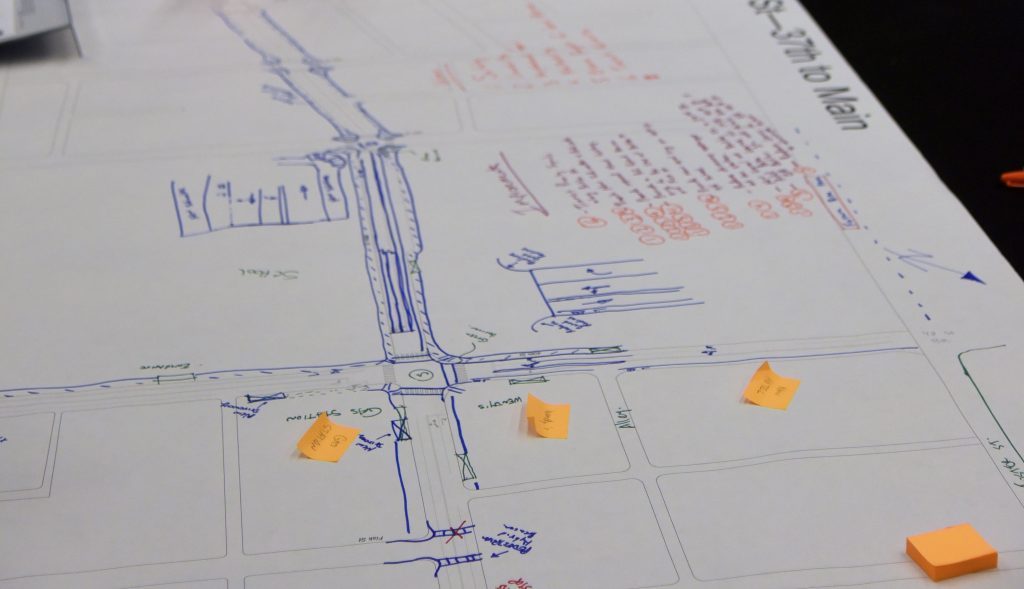
All too often these days, city transportation departments are just like the surfer desperately fighting just to stay ahead of the break of a mammoth wave. As we heard during one session about e-scooters, they’re here, the cities didn’t ask for them, and it often feels like the challenge is best stated as “they’re here and we have to find a way to deal with them.”
But instead of merely “dealing” with these new services, how can cities work to harness their potential—whether ridesourcing, automated vehicles, bikes and scooters—to accomplish something good and advance their city’s overall values, rather than just avoiding the bad outcomes? And how can cities create flexible regulatory frameworks that can be applied broadly across new mobility models as they develop?
The pace of change is perhaps the biggest part of the challenge. The best way to describe the process when cities roll out a new transit service, for better or for worse, is pretty slow and methodical. Years can pass between the day when someone first drew a new line on a map and the day that a new bus or train starts picking up passengers. But with new mobility options, it feels like the time between ideation and rollout is measured in days, not years.
To better prepare for these new services and this pace of change, we spent the better part of half a day working in groups trying to craft an ideal, holistic policy for shared active transportation—the docked or dockless bikes and scooters that are popping up rapidly in cities from coast to coast.
We were glad to be supported by Emily Warren and the team from Lime, one of the biggest companies in the U.S. providing shared bikes and scooters, to kick things off with a look at some of the hot button issues like fleet size, requirements for locking technology, and how to proactively ensure that their services are available to everyone in a community.

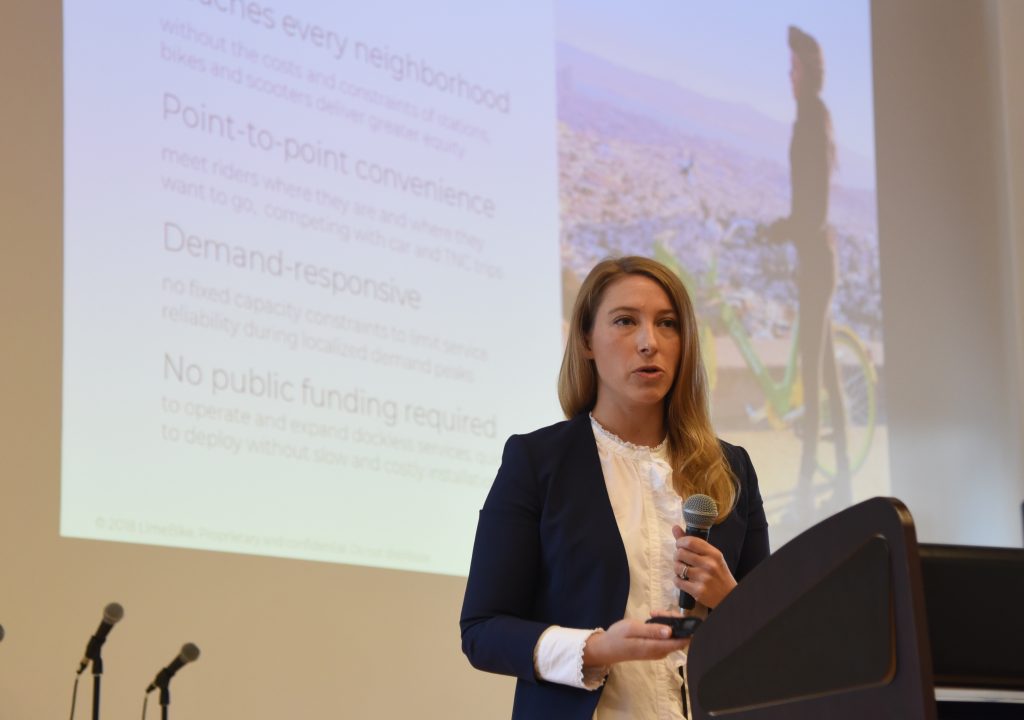
Broken up into small groups, Collaborative members chose two policy topics they wanted to develop, like equipment and safety, operations, data standards, and equity, to name just a few. Over the space of half a day, Collaborative members explored the core components of a comprehensive policy and identified key policy areas to consider, set a recommended policy floor (a fundamental basic level of policy that all cities can and should adopt), and highlighted a few options for differing levels of action in each policy area.
The exercise illustrated the power of cities coming together to solve problems, learn what’s working (or not working), and learn from each other. This is the true strength of the Collaborative and the reason we’ve continued this work for nearly two years now.
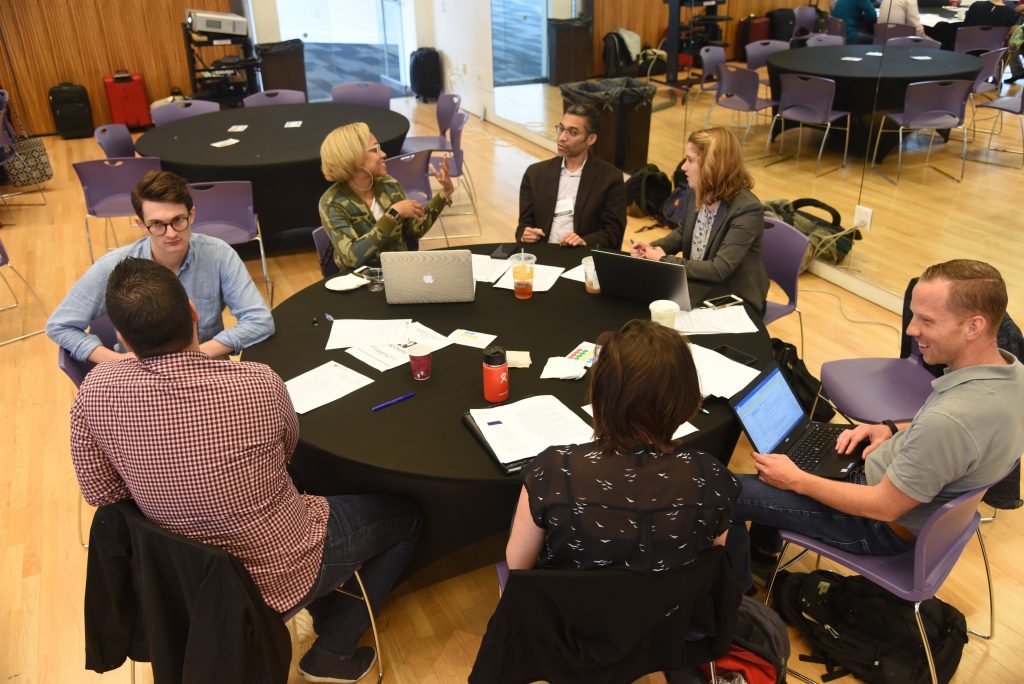
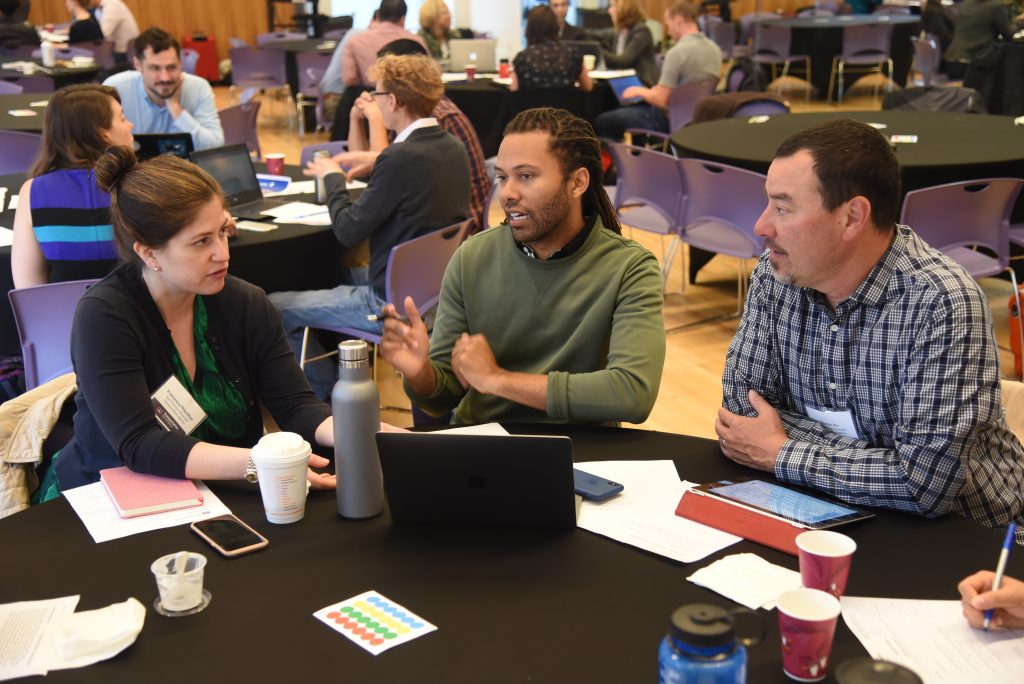
With the help of our colleagues at Smart Growth America and the National Complete Streets Coalition, we closed out the three-day meeting with a look at each city’s equity guiding policy and examined how they translate those policies into action in their projects.
Each participant shared their department’s or agency’s equity policy—or their lack of one—what that policy meant to them and how they’ve tangibly incorporated it into their projects. Participants worked to identify gaps and areas for improvement as they move forward with their projects to ensure equity and access for everyone. It was a refreshing discussion that illuminated the ongoing difficulty in applying ambitious principles to policies and then to actual projects on the ground.
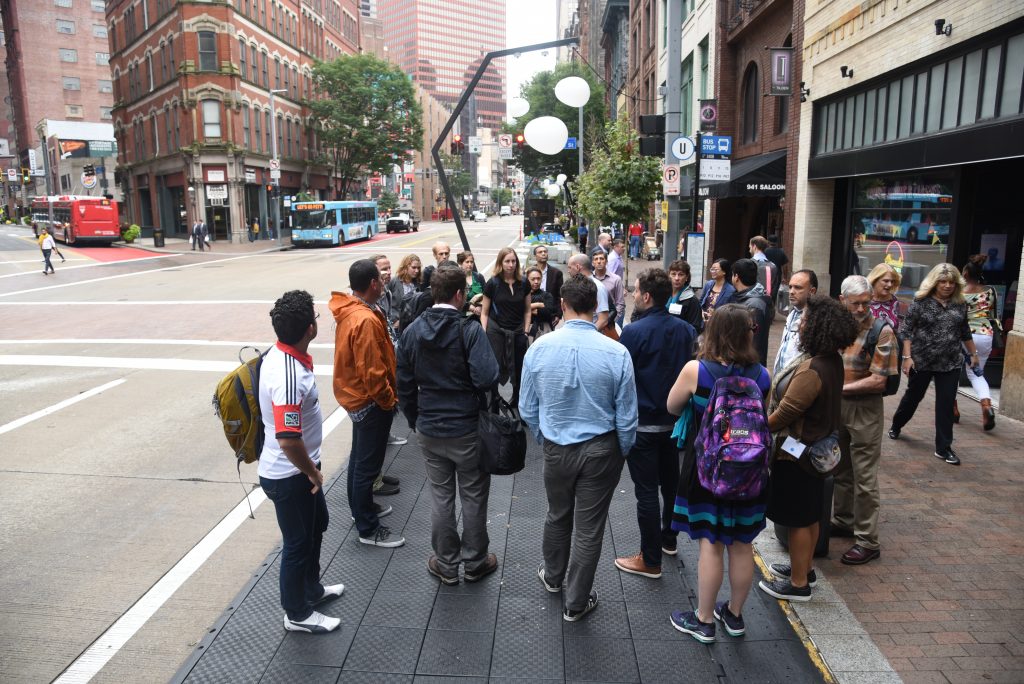
Participants getting a tour of some of the experiments going on in downtown Pittsburgh, including a painted bus lane through the incredibly busy corridor, parklets along the curb lane, artistic interventions, and a raised bus bump-out to make bus boarding easier.
The Collaborative reconvenes this December in Atlanta, just before Transportation for America’s Capital Ideas conference, which will also tackle this issue of new mobility. At Capital Ideas (open for registration now!), we will be focusing on the states’ role and how they can lead the way while also working in partnership with the providers and cities to create a transportation system that works for everyone.
Join us in Atlanta for Capital Ideas this December! Psst, find out what’s on the agenda here.
Lessons learned from T4America’s Cultural Corridor Consortium
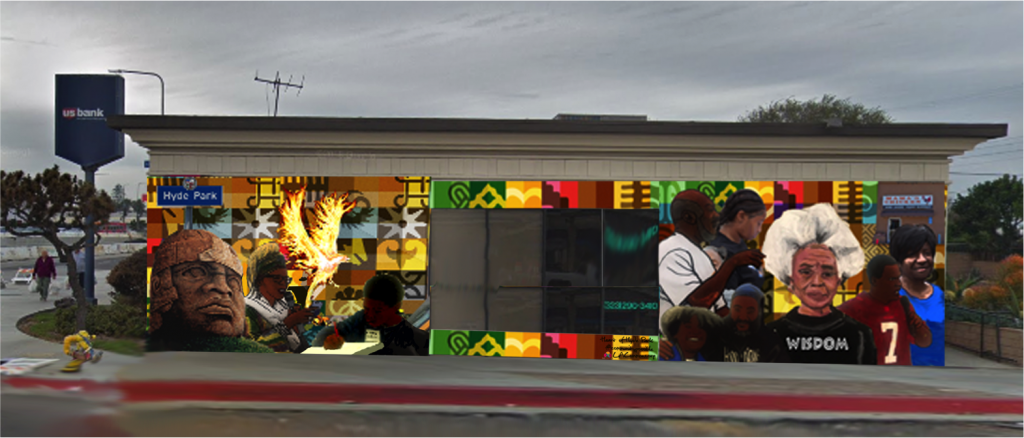
Yesterday, representatives from Dothan (AL), Indianapolis, and Los Angeles shared how local leaders, artists, city officials, and arts administrators in their communities are using the arts and creative practices to address pressing transportation challenges. Catch up with a recording of the full webinar here.

A rendering of a mural that celebrates the culture, identity, and strength of Hyde Park’s residents amidst rapid development and construction in the Hyde Park neighborhood. Photo courtesy of LA Commons.
Arts and culture can extend far beyond the performance or physical structures we typically recognize as art. These three cities in Alabama, California, and Indiana are engaging with community members, building local capacity for civic engagement, and helping build bridges of collaboration by using arts and culture in transportation projects.
On a webinar yesterday we heard from leaders in these communities who are pioneering arts & culture projects through what we call the Cultural Corridor Consortium, generously funded by The Kresge Foundation. It’s been over a year since T4America kicked off this round of projects, and it’s incredible to hear about the progress that’s been made since.
Catch up with yesterday’s webinar below and learn about how arts and culture are contributing to producing transportation projects that better serve communities in diverse contexts across the U.S.
Recap of Q & A:
Question: Did you consider moving the grocery store across I-84 so that people wouldn’t have to go outside of their neighborhood and across the highway?
Bob Wilkerson: I agree that it would be a good thing to have a grocery store within the fabric of the neighborhood. However, the grocery store owner has existed in its present location for many years and also serves an equally sizeable neighborhood on the southern extent of Highway 84 East. To your point, there were several small grocery markets located in the subject area during the past that provided an easily walkable distance for much of the neighborhood. Our hope is that through the City’s revitalization and renewal initiatives, such as the former Howell School being transformed into a senior housing community, we can entice and incentivize entrepreneurs to bring goods and services closer to our historic core neighborhoods.
Question: What is the status of FHA funding for aesthetic amenities?
Julia Muney Moore: I can say that for Indianapolis, we were very sensitive to the restrictions of the FAST Act and structured our whole project around them. We have been very careful to “brand” the projects not as IndyGo’s (because the Red Line Rapid Transit construction is largely federally funded and falls under the restrictions), but as Transit Drives Indy and the Arts Council’s project, so as not to make it seem that these projects were funded by the same source and in the same project as the Red Line itself. We also deliberately made the projects temporary for the same reason. We want to do some permanent work, but we have to wait until the Red Line is built out and running, and the federally funded project is closed out, before we start doing anything.
Question: [For LA:] How were you able to get people to engage with the project, given the conflict between the community and the planning process for the rail line?
Learn how three cities are using arts and culture to address their transportation challenges
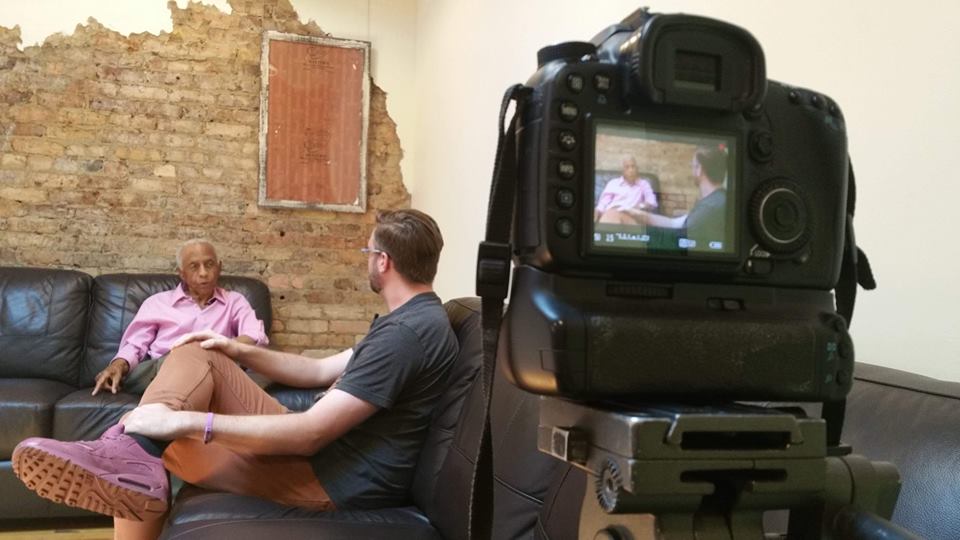
Hear from local leaders in three communities who are using the arts and creative practices to address pressing transportation challenges. (Updated)

Dothan’s Artist in Residence, Cosby Hayes, captures the stories of residents living along a dangerous high-traffic corridor.
(Updated: 9/20/2018) Catch up with the recording of the webinar here.
—
It’s been about a year since T4America kicked off the Cultural Corridor Consortium to equip three cities to use arts and culture to tackle entrenched transportation challenges and come up with more creative solutions. On Monday, September 17, we’ll feature project leaders from each of these three cities—Indianapolis, Los Angeles, and Dothan, AL—who will share stories about their creative placemaking work.
On the hour-long webinar, you’ll have the opportunity to learn about the integral role that art, culture, and artists themselves have had in transforming typical community engagement processes and the design of streets in these communities. From hiring an artist-in-residence to lead community outreach for a highway corridor revitalization project in Dothan, AL to creating artistic interventions along Indianapolis’s new bus rapid transit lines to boost ridership, the 3C participants have found a myriad of ways to use the arts to bolster transportation projects.
Join us on the webinar at 2:00 p.m. EST, on Monday, September 17 to hear from local leaders about their projects’ successes, challenges, and next steps. It may even leave you inspired with ideas for how arts & culture can play a role in solving your own community’s unique transportation-related challenges.
Focusing on the positives of dockless bikes and scooters
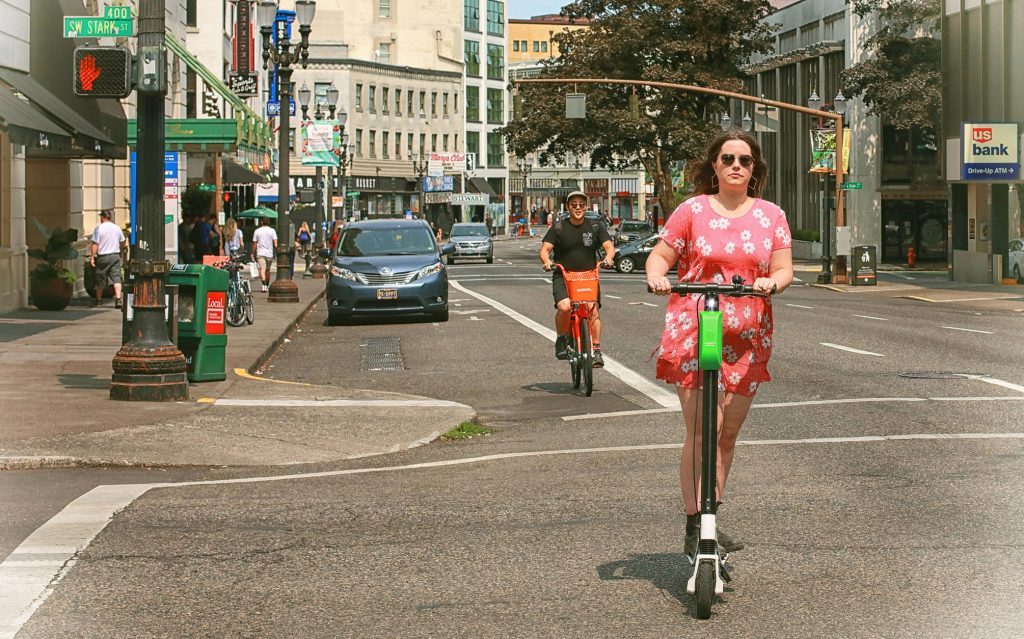
Cities are quickly passing policies to manage the influx of dockless bike share and scooters in their communities. How can they craft policies to achieve the outcomes they want, rather than simply avoiding the ones they don’t?
We’re more than halfway through 2018 and shared active transportation services such as dockless bike share and stand up electric scooters continue to expand, often without warning, to new cities across the country. As a result, cities are beginning to pass policies and regulations to manage the demands and challenges these new services create.
But, instead of shaping these services in a way that maximizes their positive impacts, so far, their policies seem to be more focused on simply preventing potential negative outcomes. In order to unlock the full benefits of these vehicles, they’ll need to craft policies that address both.
One of the starkest examples of this is how cities are allocating space for these vehicles, both when they’re in use and not. To prevent dockless scooters and bikes from blocking sidewalks and creating chaos in the right-of-way, Denver, for example, has passed requirements for operators to install and maintain painted parking zones throughout the city.
Creating parking spaces is a great way to ensure these vehicles aren’t making city streets less safe when they’re not in motion. But, this should be paired with efforts to create a safer environment for these vehicles and their users when they are in motion. In order to foster the adoption of these services and truly make their streets safer, cities should clearly articulate where these vehicles should operate and carve out protected spaces for people to ride.
The need for protected infrastructure has been apparent for years with bicyclists and pedestrians and is quickly becoming clear with scooters as well. Last month, Jenasia Summers, a 21-year-old woman in Cleveland, was struck and killed by a car while riding a scooter in a six-lane road with no dedicated space for active transportation users. Stories like this are far too common and are directly related to the low rates of active transportation users—half of Americans would like to ride bicycles more, but are afraid of interactions with motor vehicles.
To help create additional space and infrastructure for active transportation users, cities could use the fees they receive from private mobility providers to build out new bike and pedestrian infrastructure that will foster the adoption of these services.
But, even as scooter companies such as Bird are offering to give cities $1 per vehicle per day for cities to use for better bike infrastructure and safety measures, cities aren’t actually codifying this in policy.
A city’s budget reflects its priorities. If cities are truly committed to increasing active transportation, they should include provisions to directly allocate revenue from these services toward providing better infrastructure as these vehicles increase in popularity. Even if the total amount of money isn’t much, it’s an opportunity for cities to carve out space for their stated priorities.
A greater focus on the positive impacts of new mobility options can go beyond safety. In its updated Free Floating Bike Share Permit Requirements, the Seattle Department of Transportation (SDOT) has incentivized providers to offer adaptive cycles as part of their fleets. Adaptive cycles include a range of two- or three-wheeled vehicles, such as tricycles, hand-pedaled cycles or recumbent cycles where the rider leans back in their seat, that can be used by individuals who are unable to operate a two-wheeled bicycle. To put more of these on the road, SDOT will allow operators to expand their fleets if they provide a certain share of adaptive cycles.
Additionally, SDOT has specified in their policy that they will allocate $50,000 from permitting fees toward developing and leveraging community partnerships to increase adaptive cycling ridership and access. While it still needs to clarify some of the specifics of how these partnerships will work, SDOT has clearly outlined its priorities to increase access by providing incentives to private mobility providers and has allocated additional resources to engage people with disabilities to increase ridership.
It’s very early in the process of determining how to regulate these new shared active transportation services and there’s still much to learn about how best to utilize these new mobility options in service of our long-term outcomes. But, as cities integrate them into their communities and are generating revenue from their operations, there’s an excellent opportunity to chart a new course and develop regulations in way that truly advances their long-term positive outcomes, rather than simply trying to prevent their negative impacts.
At our next Smart Cities Collaborative meeting in Pittsburgh, we’ll discuss these challenges and explore policy provisions for shared active transportation services that maximize their benefits. Stay tuned for an update on what we learn, what the biggest challenges are, and what a model policy could look like.
Burlington, North Carolina embraces transit in a growing community
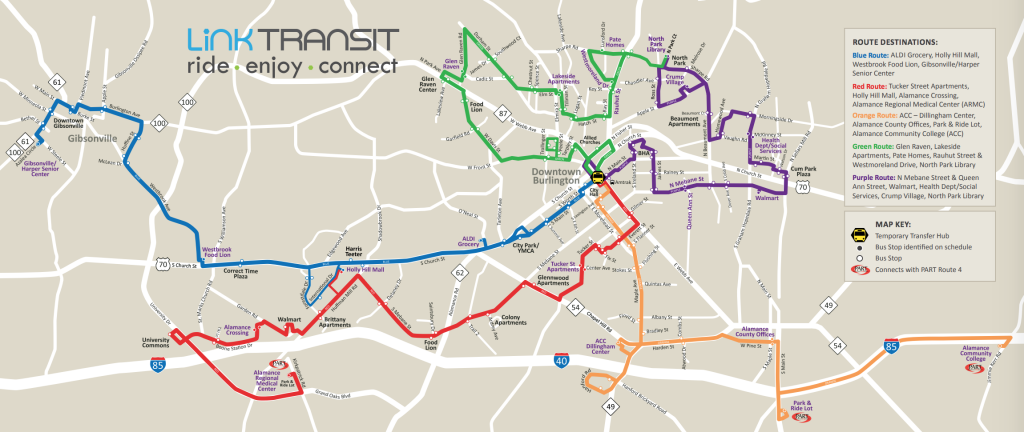
Residents in Burlington, NC have greater access to jobs today thanks to a new transit system, which launched in 2016. A far cry from a large, transit-rich city, Burlington is showing how important public transportation can be for smaller communities. Many residents are already pushing for service extensions and longer hours for the fledgling system.
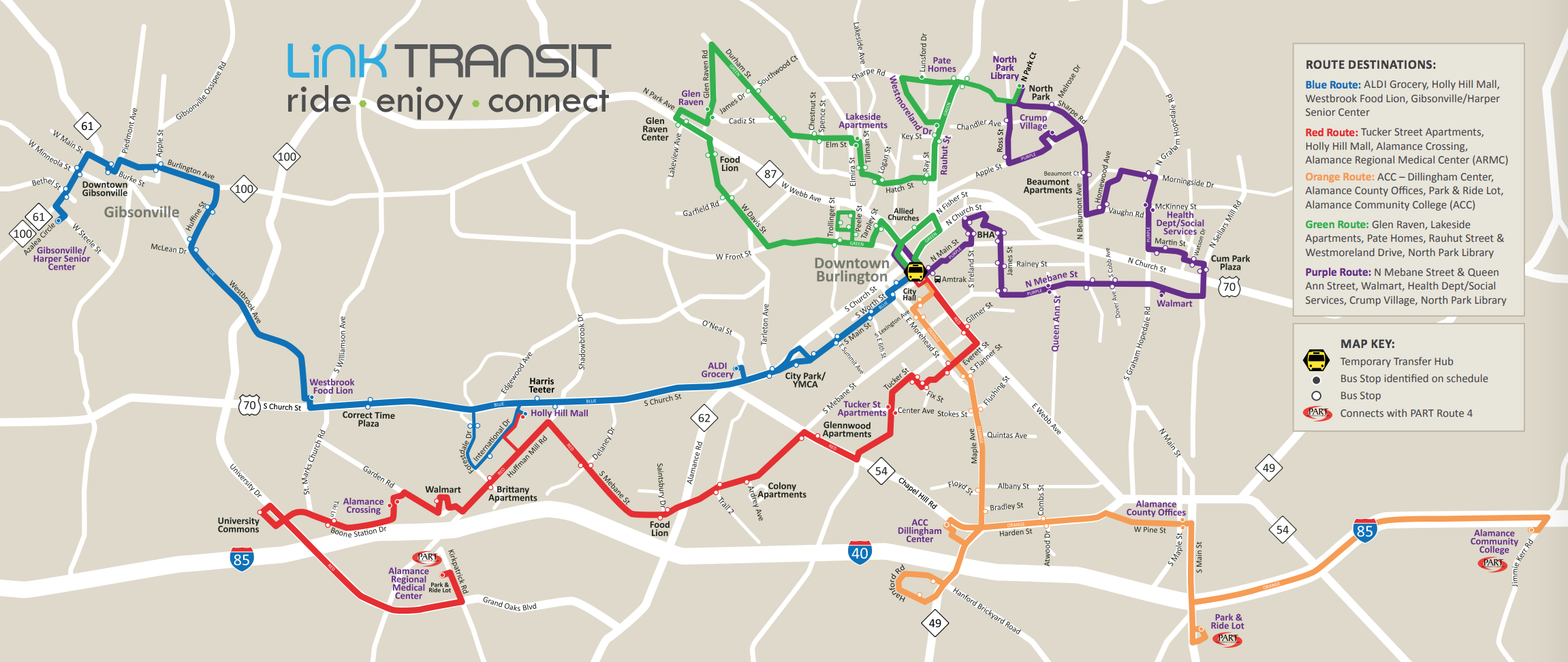 Link Transit’s current route map. (Image: Link Transit)
Link Transit’s current route map. (Image: Link Transit)
Burlington, NC is located roughly halfway between Greensboro and Durham/Chapel Hill just north of Interstate 85 with a population of approximately 52,000. (For comparison, places like Allen, TX and Greeley, CO are home to about twice as many people as Burlington.) But up until 2016 this growing area had only a countywide, on-demand shuttle service operated by Alamance County Transit Authority (ACTA). Reliable, fixed-route transit was nonexistent.
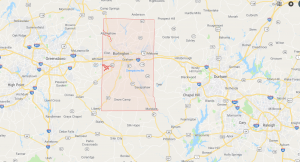
Burlington sits at roughly the center of Alamance County, NC. The county is shaded red. (Image: Google Maps)
As the town and region grew, increasing transportation options to provide better access to jobs and opportunity became more important. “Our citizens are starting to expect it as an option, whether they use it once a week or everyday,” said Mike Nunn, Burlington’s Transportation Director. “We need this as an option in our community.”
“We had a lot of folks who had never been from one side of the community to the other. They hadn’t been to the new retail development because they didn’t have transportation—nor could they get a job in that area because they didn’t have transportation,” Nunn said on a recent T4America’s webinar.
The Burlington-Graham Metropolitan Planning Organization (MPO), which encompasses all of Alamance County, actually began planning a fixed route service all the way back in 2008. Nunn emphasized that an important piece of the planning effort included educating the public and local elected officials because the community was unfamiliar with the benefits of a fixed-route transit system.
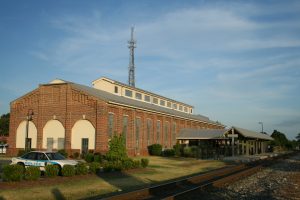
The Burlington Amtrak station. (Image: Ildar Sagdejev, Wikimedia)
In June 2016, LinkTransit began serving Burlington and other nearby cities. The service consists of five color-coded routes connecting in the center of Burlington and extending to neighboring Graham and Gibsonville. LinkTransit connects to intercity express bus service that goes east to Chapel Hill and west to Greensboro, as well as Amtrak service.
LinkTransit links employers to employees
Nicole, a Burlington resident, told local Fox 8 how important the new transit service was for her. She said she couldn’t afford a car and finding reliable transportation to her job at Best Buy was a challenge: “It’s been really tough getting back and forth to work because you never know if someone’s going to pick you up or drop you off,” she said. “So at least now I know I’ve got a concrete way to get to work.”
Though the service currently only operates from 5:30 a.m. to 6:30 p.m., Monday to Friday, residents are already requesting greater frequency, new stops, and expanded hours to meet non-traditional commute schedules.
“Everyone would like it to run seven days a week already,” said Nunn. “We are sixteen months in, and that is the first thing we hear. And also, for employment, to go to 7:30 or 8:30 at night. That’s a funding issue. That just takes dollars.”
Businesses are also responding. Nunn added that employers are frequently advertising their jobs as “on the green route” or “on the purple route.” LinkTransit already extended a main commuter route, the Orange Line, adding two additional stops near three hotels, a truck stop, and industrial suppliers like Delta Gypsum and Ferguson. Before the route extension, riders would get off at the end of the line and walk more than a half mile and under a highway overpass to reach jobs at these businesses.
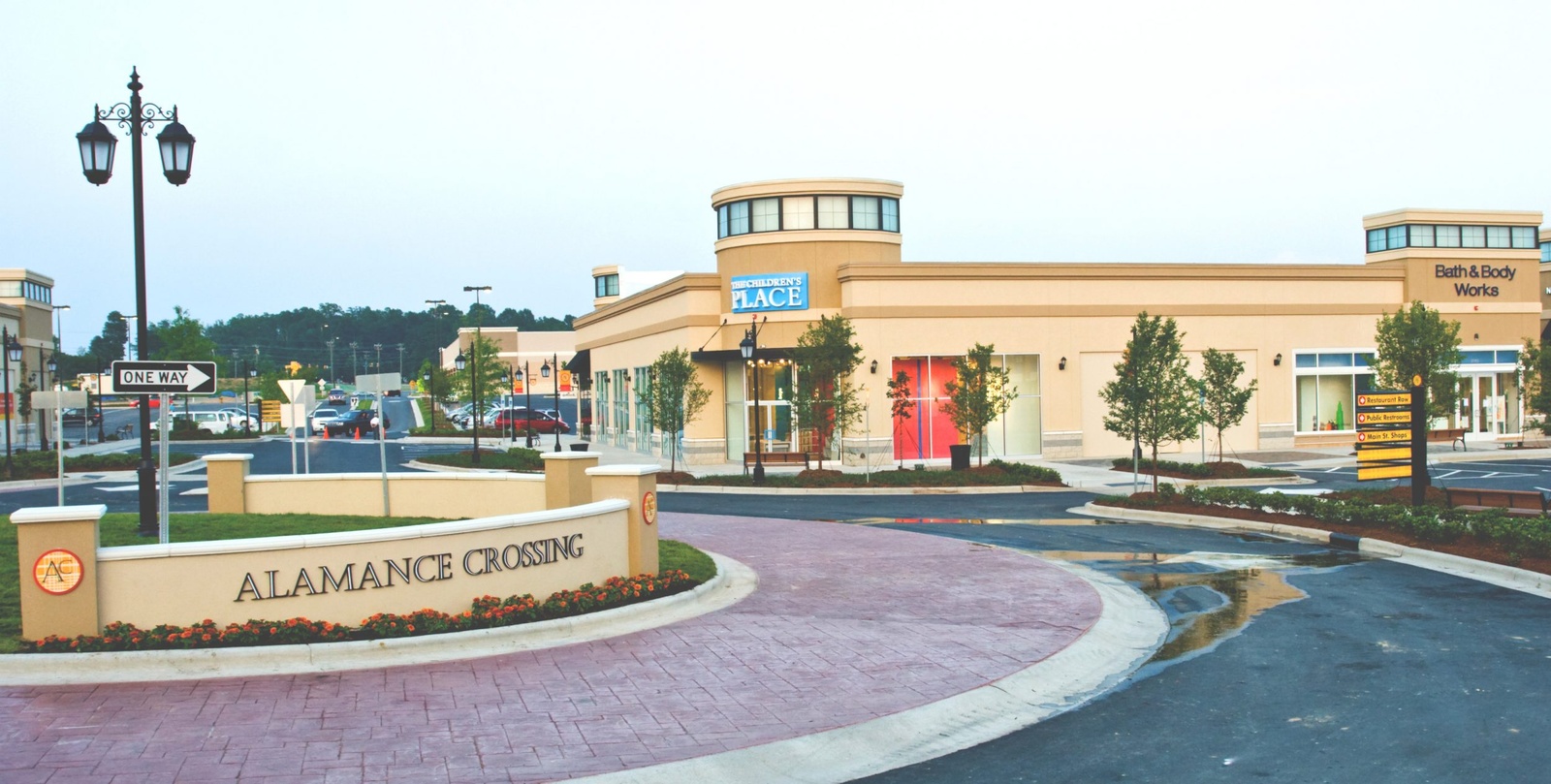 Alamance Crossing, Burlington’s second and newest (outdoor) shopping mall, is served by the red route. The Holly Hill Mall is served by the red and blue routes. (Image: A_Moffa, LocalWiki)
Alamance Crossing, Burlington’s second and newest (outdoor) shopping mall, is served by the red route. The Holly Hill Mall is served by the red and blue routes. (Image: A_Moffa, LocalWiki)
The new bus service was a major factor in the decision of PRA Group to open a 500-job call center at Burlington’s Holly Hill Mall in 2017. The debt-buying company, which has more than 5,000 employees in offices in twelve countries, cited public transit access as a major factor in their selection of the mall site, which is strategically located at the transfer stop for the red and blue bus lines.
“Access to a skilled workforce is the number one consideration of companies looking for a new location,” said Peter Bishop, City of Burlington Economic Development Director. “LinkTransit provides a critical piece of infrastructure in our efforts to compete with other communities for new jobs and investment.”
Do you work for an operator of a rural transit system? Are you someone who rides it frequently? We want to hear from you.
Share your rural or small city transit story here



